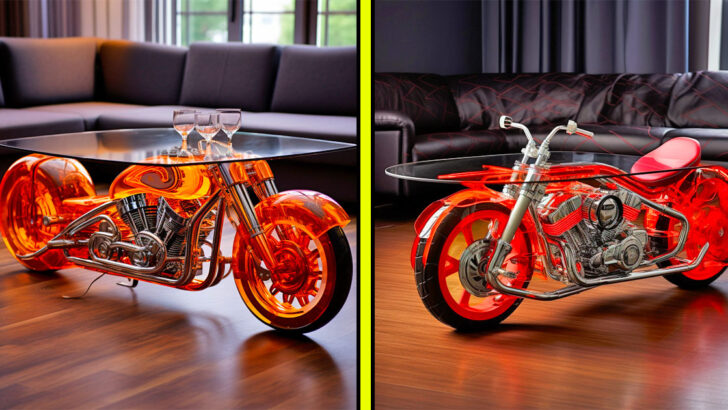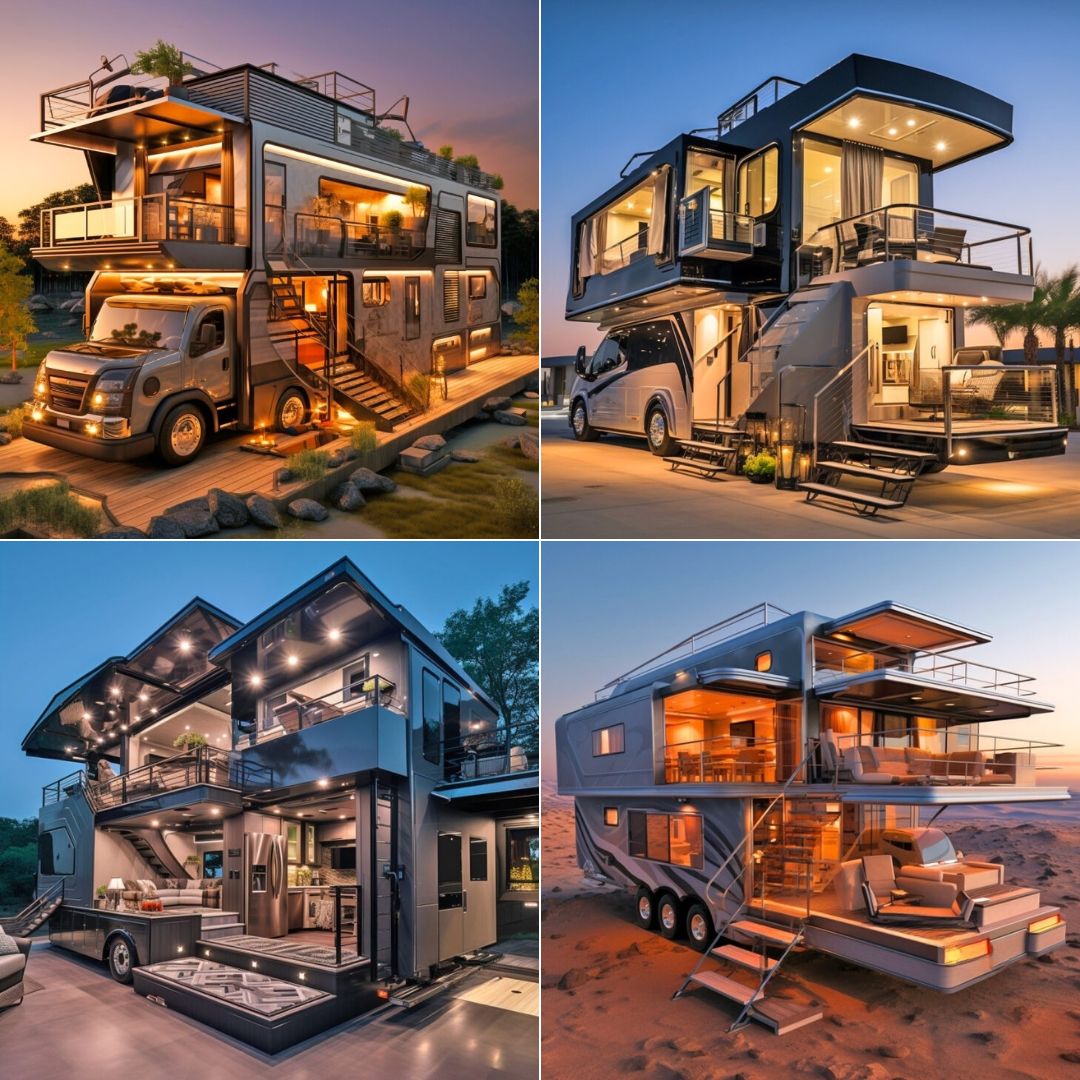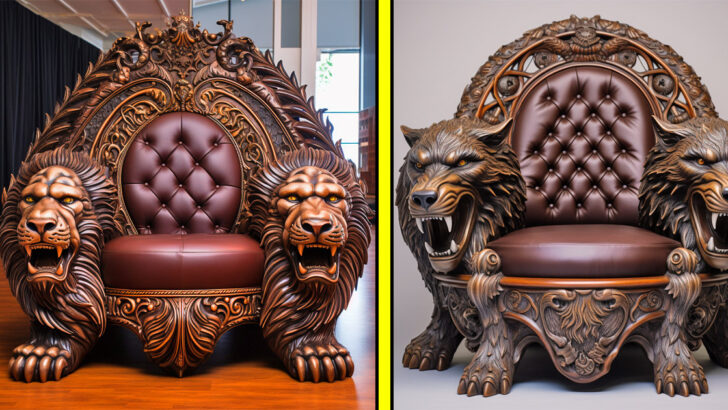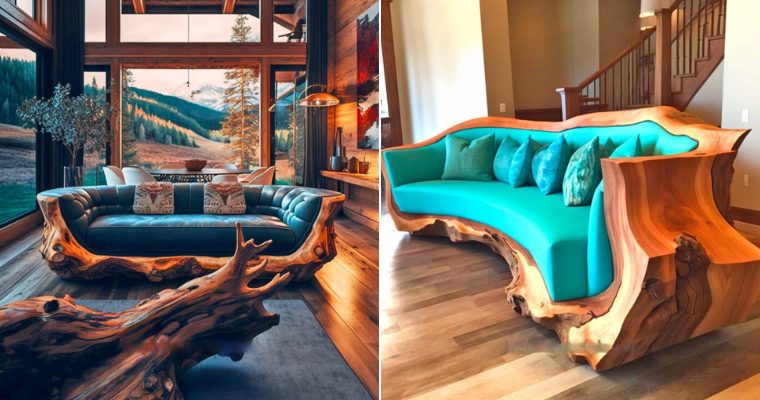If you’ve got a spatially challenged outdoor space you might think you’re limited for what you can achieve. However, there are a tonne of wonderful and creative small garden ideas to transform even the tiniest plot.
Petite spaces may require a little more thought than larger garden ideas, but they come with plenty of welcome advantages. For a start, it forces you to be a little more inventive, which can often result in serious style and beauty. The other big plus is that due to their size, more often than not they’re delightfully low-maintenance.
Chris Bonnet, Founder of Gardening Express(opens in new tab) says ‘Whilst they certainly pose some challenges, small gardens are usually much easier to maintain, plus they’re generally more budget friendly too. Even if you’ve only got a tiny terrace or balcony to work with, you can still enjoy your outdoor space with the help of careful planning.’
‘Containers, hanging baskets and window boxes will all come in handy if you want to plant in the limited space you have.’
Francesca Hadland, Styling Expert at Bridgman(opens in new tab) agrees, ‘When space is at a premium, designing and decorating your garden can feel like an impossible task, but small gardens have huge potential.’
Small garden ideas
‘First, decide on the main role for the space,’ adds Alix Hollingsworth, award-winning garden designer and co-founder of Dig Club(opens in new tab). ‘Committing to a single use in your garden if it’s small is important; choosing what you’d like the garden to be primarily used for (such as a dining area, drinks terrace or only a space for planting) means it won’t feel overly busy and cramped.’
Whether you’re looking to create an impressive balcony garden, squeeze outdoor furniture into a courtyard or fill a plot with greenery, you’ll find lots of small garden ideas to inspire you.
1. Captivate with containers

You might not have space for flowers beds or a lawn, but you can still bring plants and small trees into your garden, through pots, planters and containers, an easy garden idea.
Marcus Eyles, Horticultural Director at Dobbies(opens in new tab) advises, ‘If you don’t have the space for beds and borders, you can still achieve an impactful display with containers. Early season Primroses, Violas and Pansies work well in pots for beautiful spring colour, and you can cluster these together for maximum effect. Hanging baskets and window boxes are another great space saver and can be filled with seasonal plants for a cheerful display.’
2. Turn a tree stump into a table
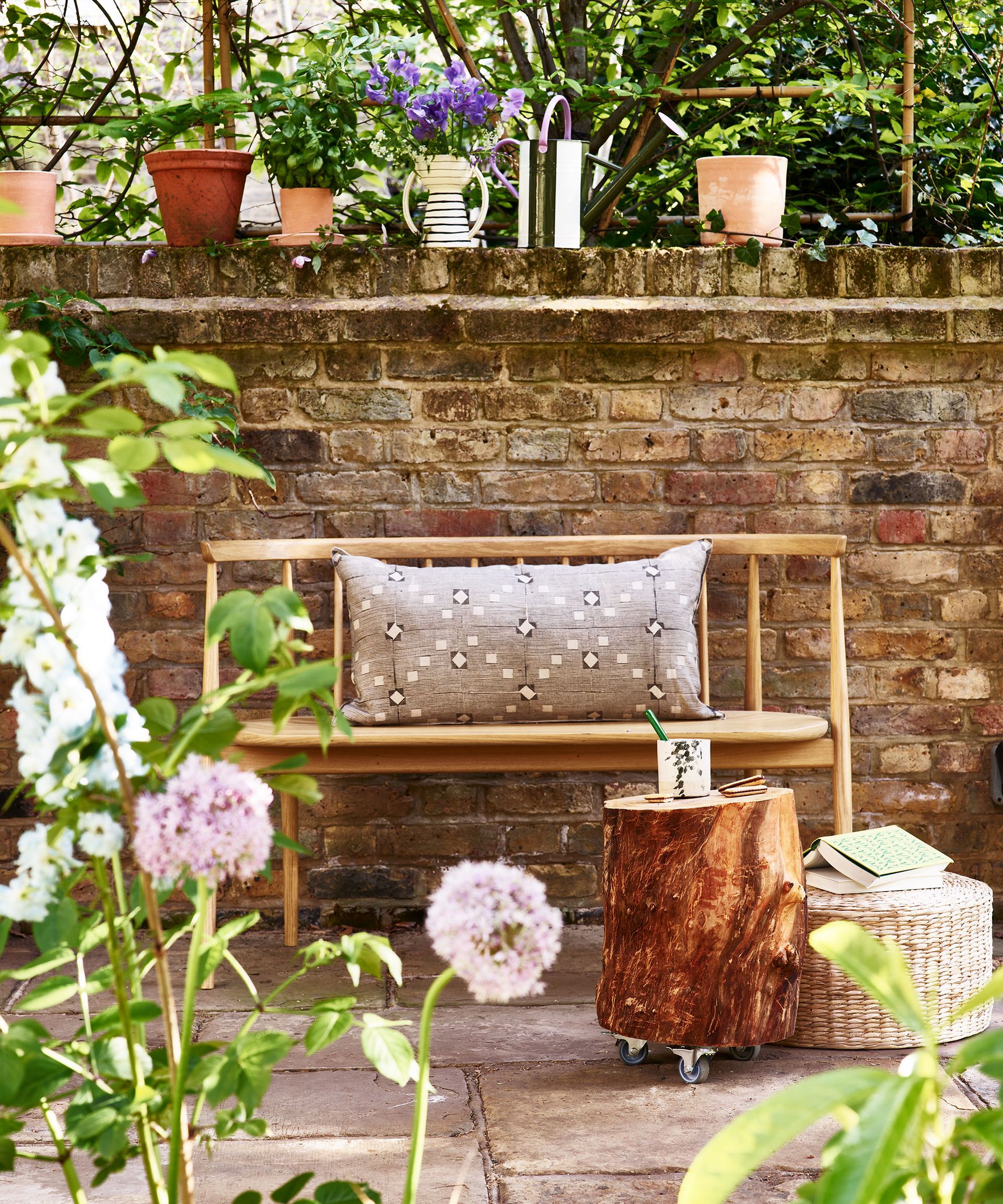
If your space is too wee for a traditional garden table and chairs set up, try incorporating a small side table as a place to rest your alfresco cuppa (or even better, sundowner.)
If you’re looking to make space by cutting down a tree or too, recycle the wood by sawing up lengths of the trunk, stripping it of bark and attaching castors to the base. Alternatively, check your local neighbourhood portals or the local paper for anyone getting rid of tree stumps. Make sure you use locking castors for safety, so the table doesn’t run away from you.
To give it a twist, paint the top with outdoor paint to add a touch of colour to the table surface.
3. Opt for flexible furniture
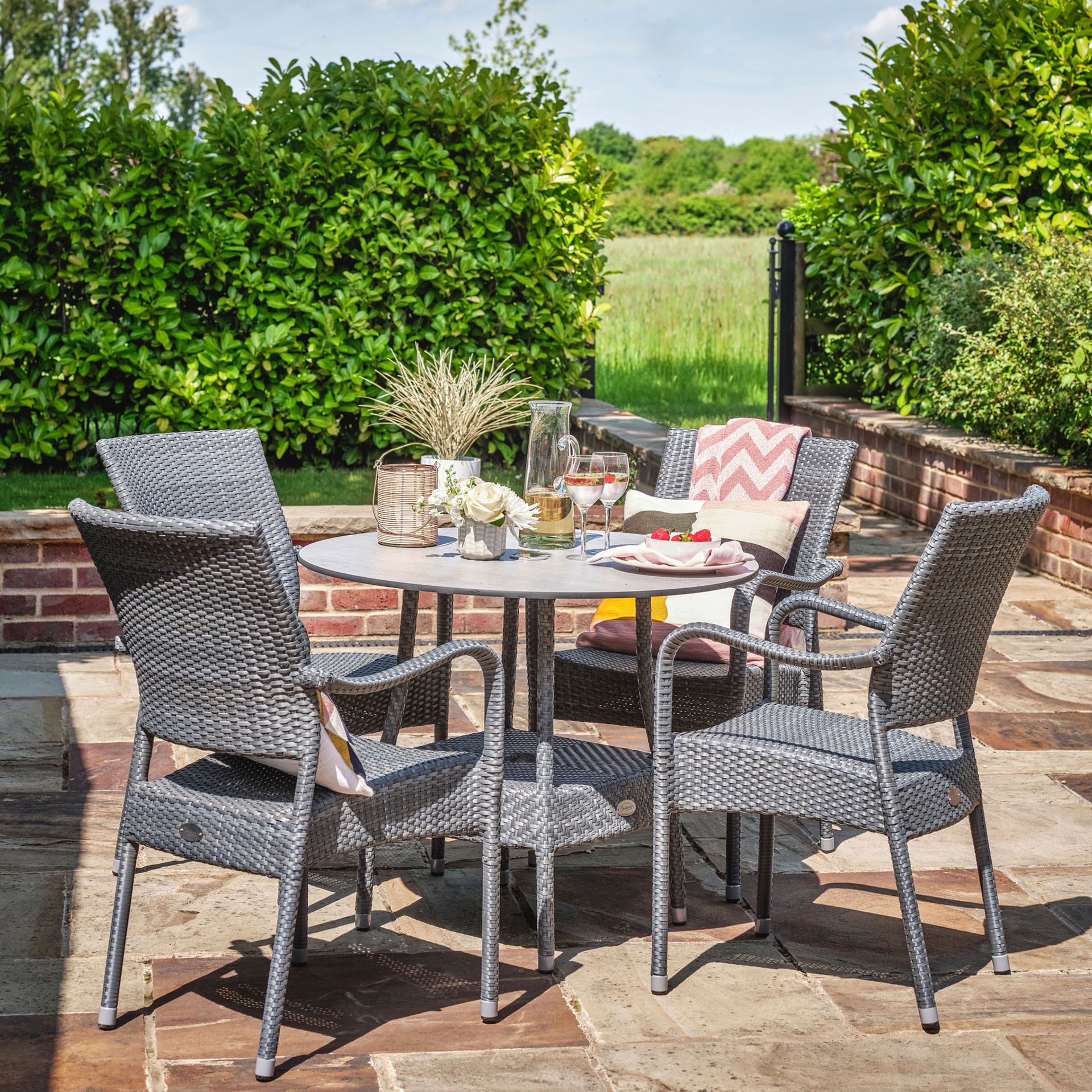
Finding the best garden furniture for your outdoor space is worth spending some time on, especially if space is at a premium.
Francesca Hadland, says, ‘Steer clear of cluttering up a petite patio area with furniture that sits unused most of the year. Think smart with stylish and space-saving flexible furniture. Choose chairs, bar stools and even loungers that can be stacked on top of each other and stored away when not in use. Pair with a foldable table for a set you can effortlessly move to one side whenever you choose.’
4. Turn to trailing plants
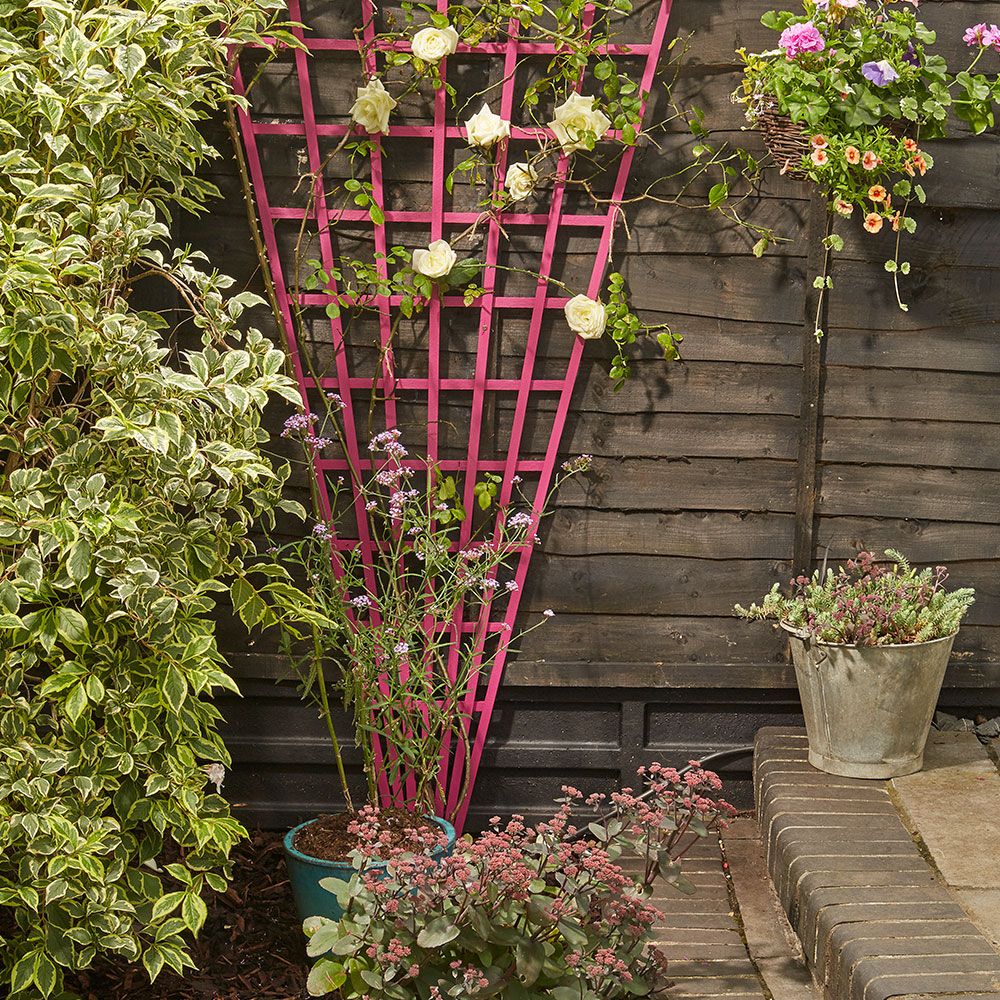
Make use of a garden fence to add colour and greenery. Climbing plants and trellises are a great solution for small gardens, as they lift flowers and foliage up off the ground.
Marcus Eyles at Dobbies advises, ‘Climbing plants are a great way to add charm and dimension without sacrificing a lot of space. Varieties such as Clematis montana and Sweet peas work well with most fences and walls and will elevate your garden with their eye catching flowers and fragrance.’
5. Make your fencing work harder
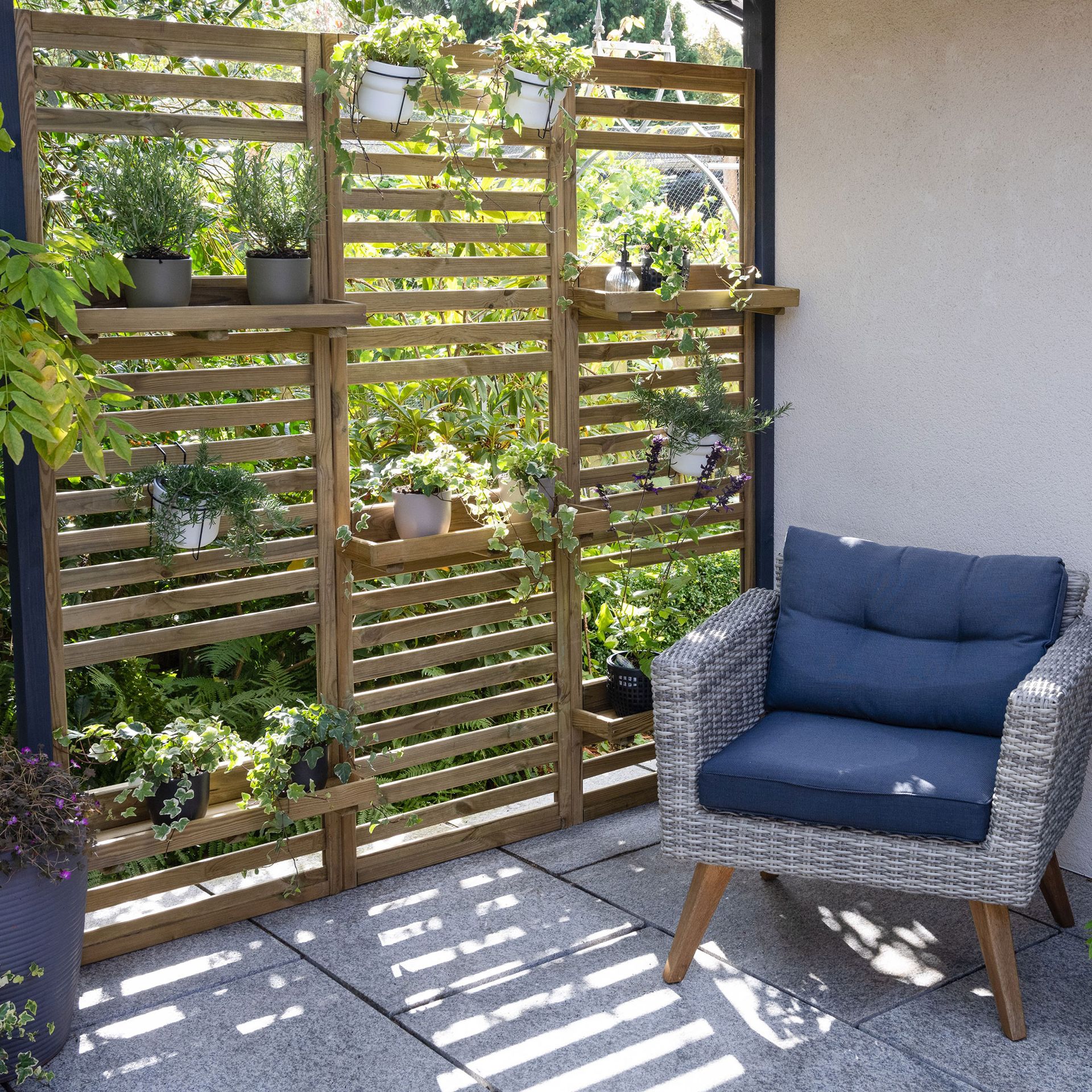
Take inspiration from the elements of a living wall, by using vertical wall space for thoughtful planting. This allows even the smallest of garden spaces to flourish and is particularly useful if you are looking for decorative grassless garden ideas.
The simple yet savvy addition of horizontal fence panels can turn the side of the shed, a stretch of bare fence or the side of a balcony into a decorative living wall. Any of these small outdoor spaces can be transformed into a vertical garden, accommodating smaller plant pots and baskets.
Jenny Davis of Forest Garden(opens in new tab) says, ‘How gardens are used is changing and now we are seeing more versatile uses of space, with sections dedicated to growing, entertaining and recreation.’
‘Our slatted wall planters, £99.99 each, Forest Garden(opens in new tab), are a fabulous accessory. Not only do they allow spaces to be partitioned but in smaller gardens they are great for creating a living plant wall, bringing greenery to exterior walls.’
‘In 2023 I expect we are going to see people get really creative making use of every inch of their garden.’
6. Think vertically
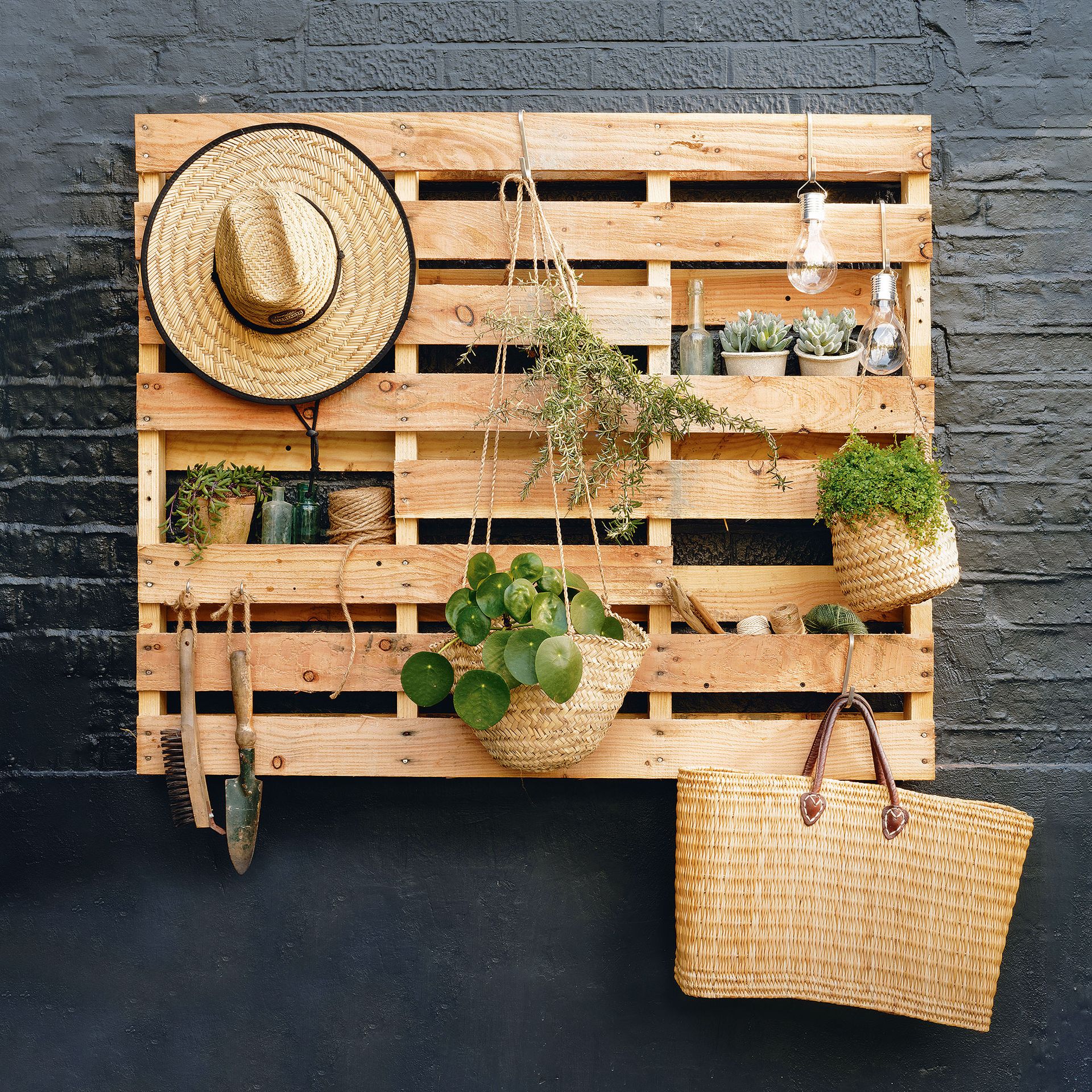
Save precious outdoor square footage – be it lawn or patio – by taking what you can off the ground. If you have a wall or strong fence available, this is the ideal spot to affix a slim shelving unit. Alternatively, DIY it by exploring pallet ideas for gardens.
You can use these levels to display potted plants, keep smaller garden accessories, and to double up as somewhere to set your drink or hold your hat.
Marcus adds, ‘When it comes to designing a small garden, making the most of the space you have is essential so vertical planting options are a great solution. Not only will these free up room, they’ll create an instant impact and can be used to grow everything, from flowering plants and perennials, to herbs and leafy greens.’
7. Repurpose an old step ladder to display plants
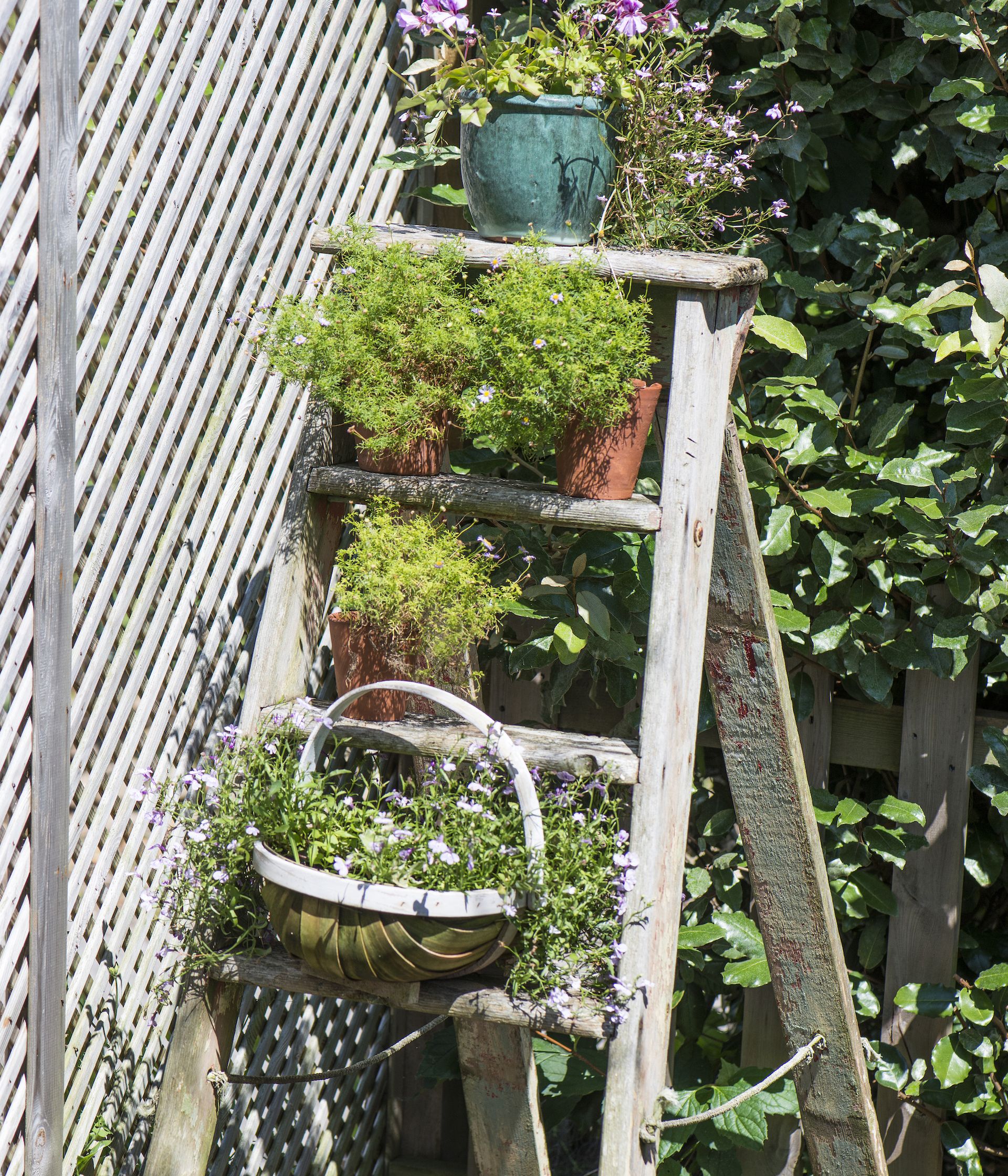
This is another way to take pots and planters off the ground. By placing them on the steps of a step ladder you’re freeing up the space below for more greenery. The well worn appearance of an old or no longer used wooden step ladder also adds rustic charm to your garden.
This planting solution creates extra space to showcase potted plants and garden accessories. No matter how small your space, you can guarantee you’ll be using it as efficiently as possible.
8. Go big with variety
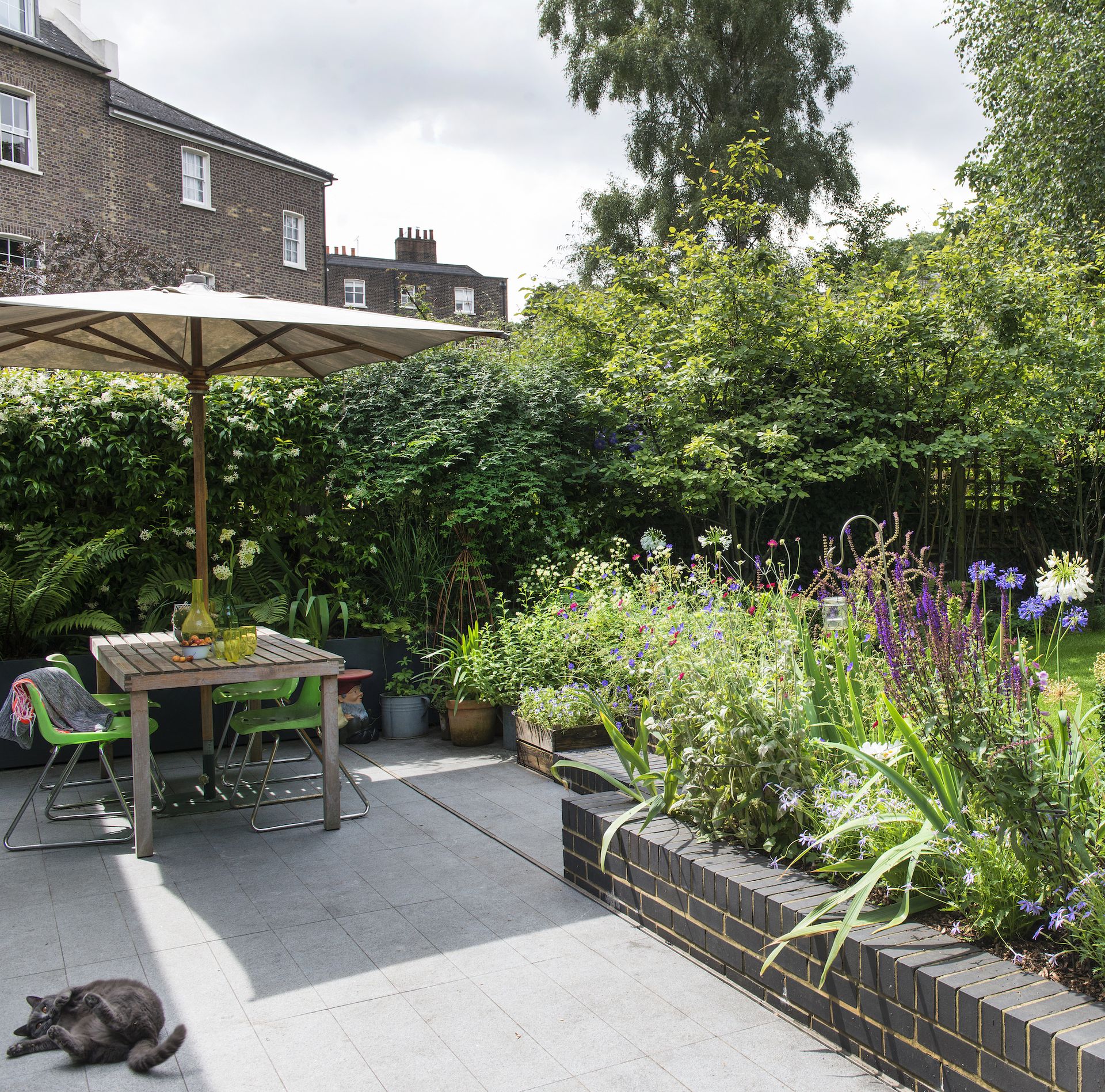
‘Don’t be tempted to plant only small plants as these will only emphasise the space of a small garden,’ says Alix Hollingsworth of Dig Club. ‘Instead plant a range of sizes to create shape and variety.
‘When planting shrubs, opt for larger specimens but don’t go for very dense varieties as these will look like they take up more space than they do. If you want a tree, choose multi-stem ones which appear lighter, as you can see through the stems to the rest of the garden.’
9. Create a layered look
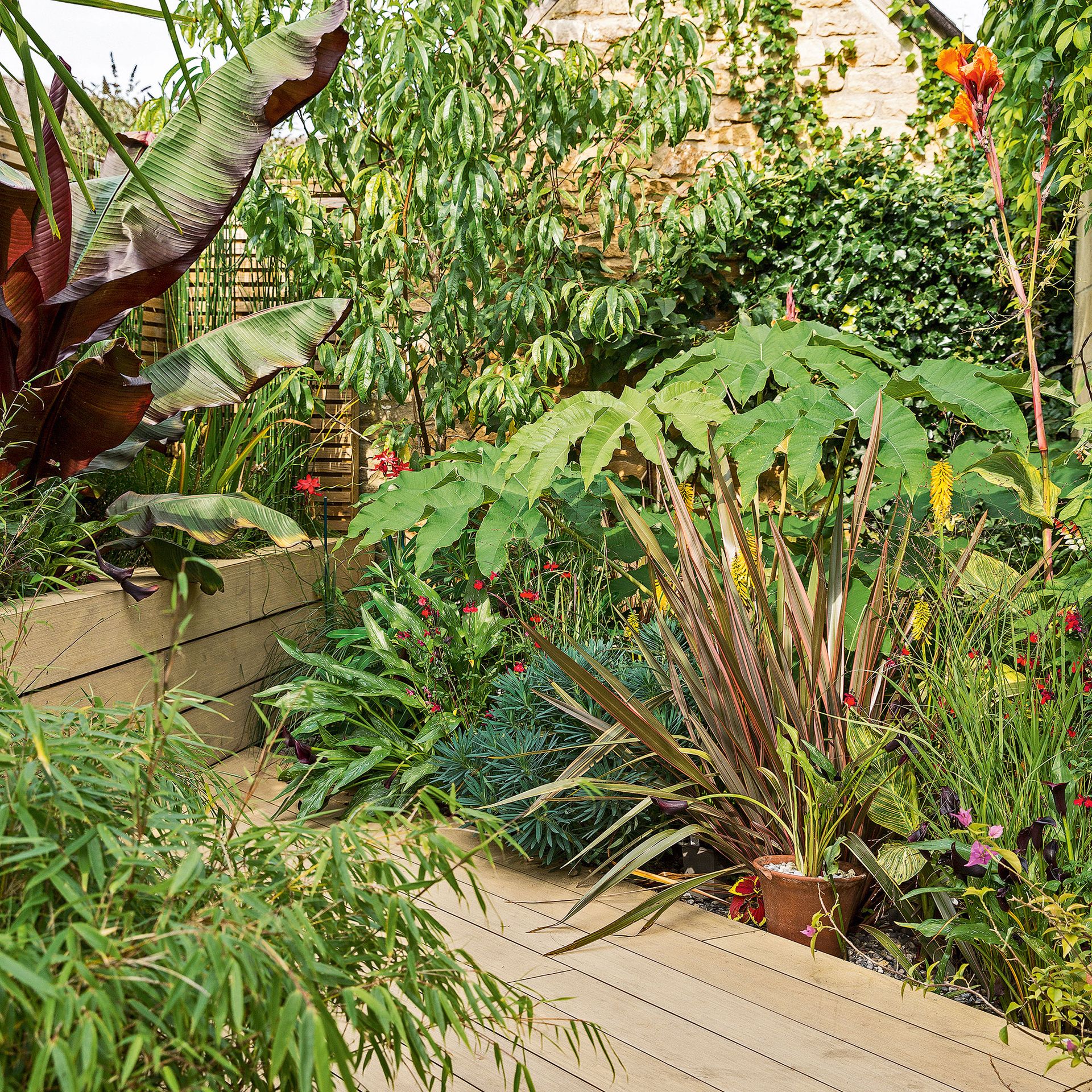
Layers don’t just add the illusion of depth when in your hair – they can go a long way in gardens, too. Combine both raised beds and ground levels beds to add height and create a layered look to your planting, implying the presence of much more foliage than there actually is.
Additionally, slightly raising a path or walkway will make the ground level planting seem taller, too. It’s really beneficial to work out how to plan a small garden in advance of starting.
10. Shade a dining spot with an awning
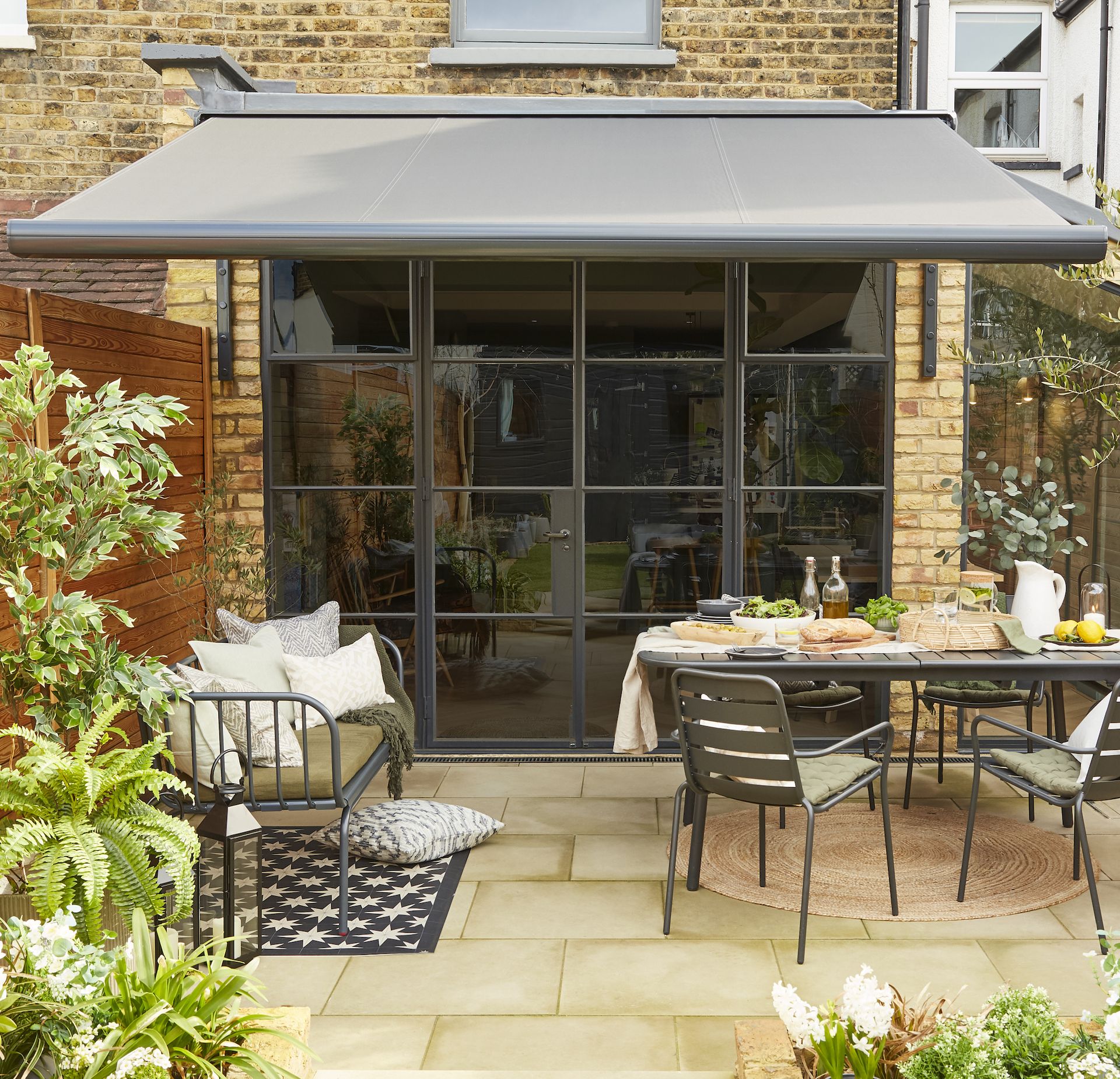
There’s no denying that pergolas draped in Wisteria look lovely but in a small garden it may simply not be practical.
‘It’s not a great idea to put pergolas right up against the house as this can cause a lot of unwanted shade in the winter,’ says garden designer designer, Charlotte Rowe (opens in new tab).
If you’re going to want shade during alfresco summer lunches without limiting light in your home over the winter months, an adjustable awning is a great space-saving option for petite patios.
11. Attract wildlife with flowers
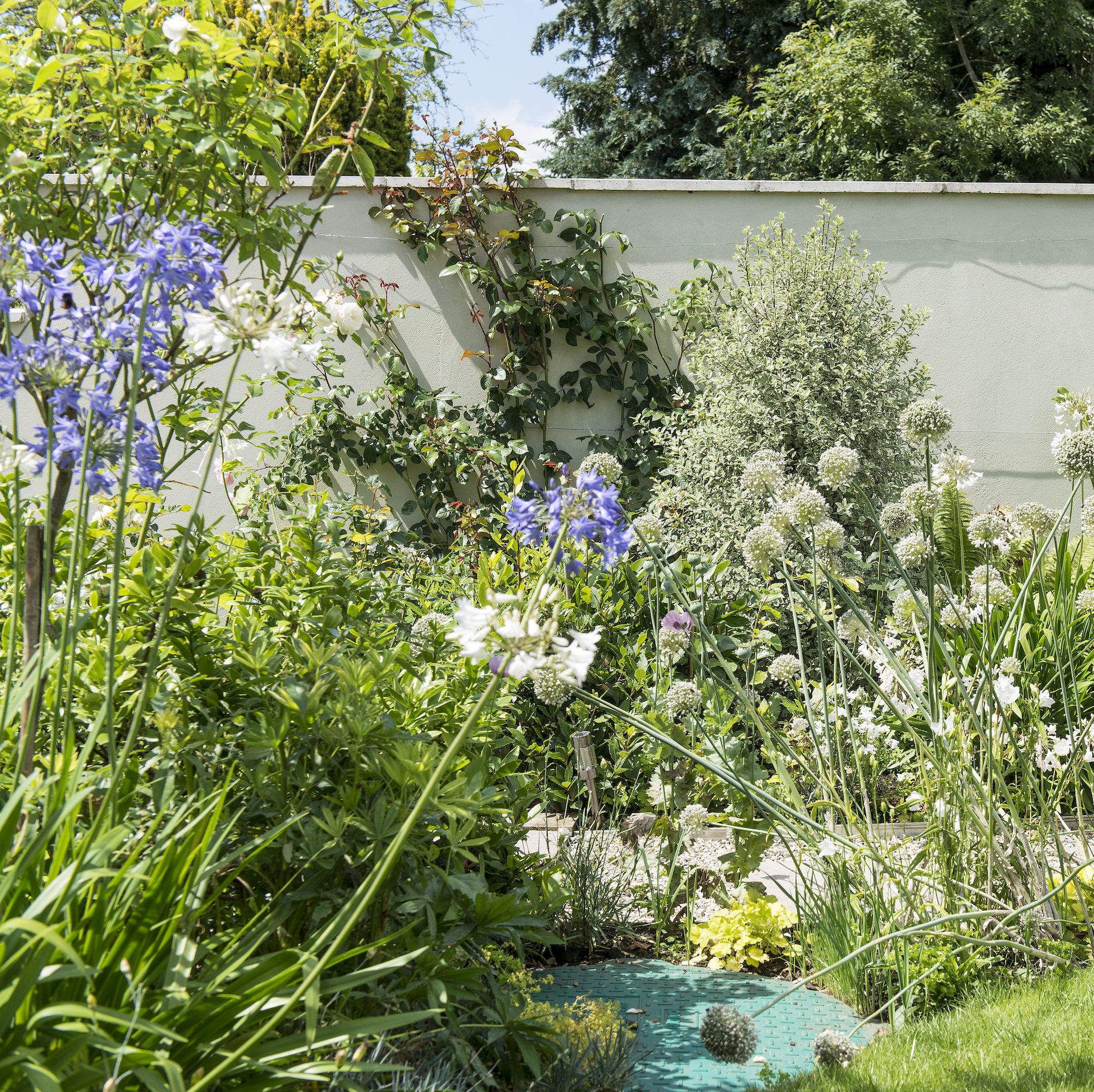
Just because a garden is small doesn’t mean it can’t provide a home for nature. Hang nut and seed feeders for birds on tree branches and leave a tray filled with water for them to drink and bathe in.
Leave gaps in fences to create a hedgehog highway and fill your garden with colourful flowers to attract butterflies and other pollinators. It will not only make your garden a calming space, it will delight little ones when they spot visiting wildlife too.
12. Plant according to sun and shade
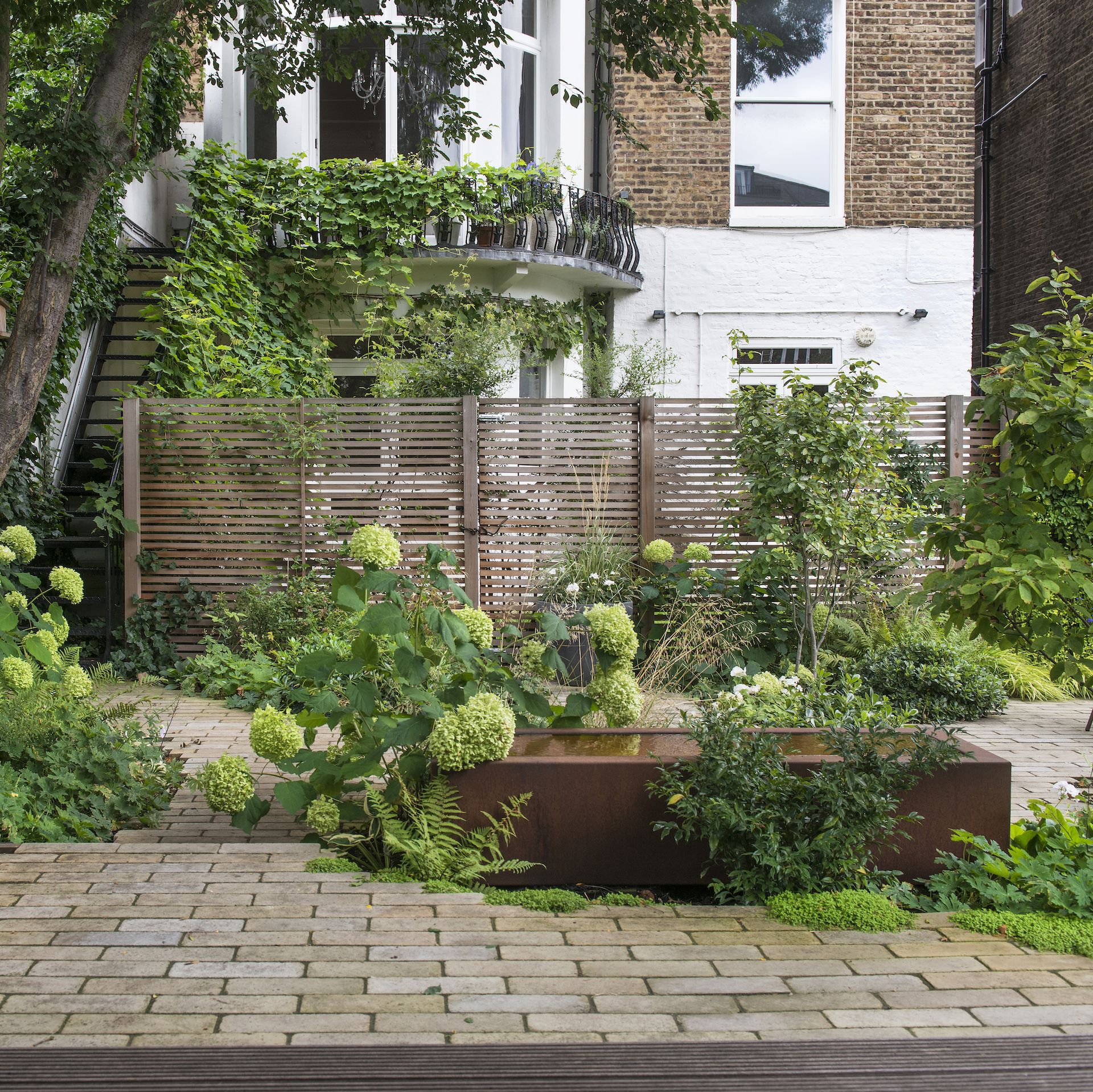
Plants need sunshine but there are plenty that don’t like direct sun all day and prefer shady spots. So plant according to your garden’s situation, as well as its soil.
‘Shady gardens can still look fabulous,’ says Alix Hollingsworth at Dig Club. ‘If your small garden doesn’t get much sun, don’t worry, you can still fill it with wonderful plants that can bring character and personality to the space.
‘“Jungle” or “Forest” style plants such as Ferns, Dwarf Bamboo and impactful shrubs like Fatsia japonica with their large leaves can help fill the space and create a lush, green haven. Colour can still be delivered through Geraniums such as ‘Rozanne’, Alliums and Irises which provide pops of confident colour amongst the greenery.’
13. Turn it into a tropical oasis
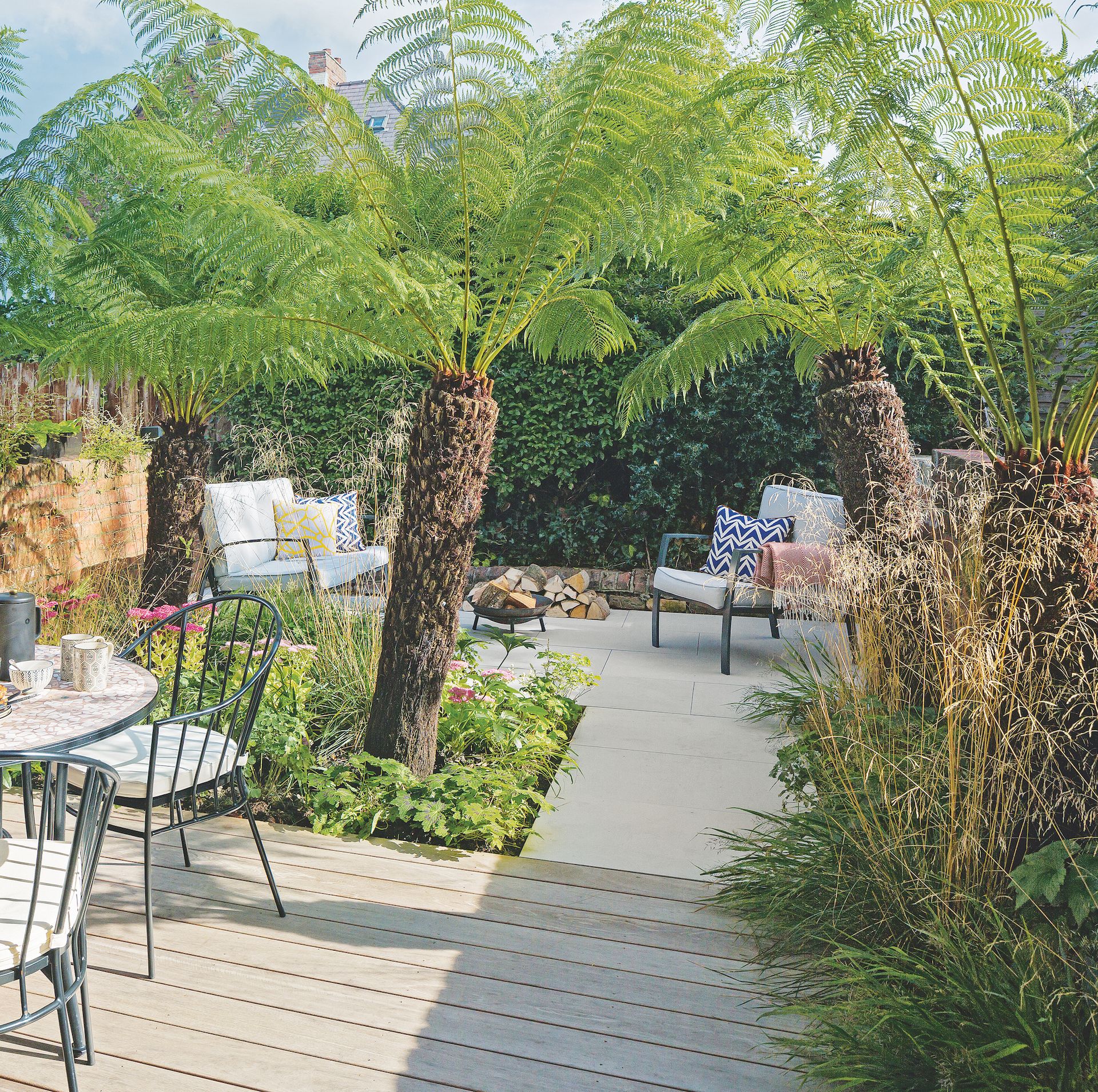
Outdoor living is wonderful but noone wants a garden filled with furniture and devoid of life. Fake plastic grass is depressing and too much concrete looks soulless. So create plenty of pockets of foliage around paths or patios with hedges, shrubs and trees.
If your small garden doesn’t get much frost, grow species that thrive in warm weather such as grasses, palms and tree ferns (which like partial sun and shade). Tropical plants like these will give your garden a holiday feeling all summer long.
These living elements will make your garden more enjoyable for you and your family too.
‘Trees bring several other benefits to your garden, such as the calming sound of leaves rustling in the wind and lowering the volume of artificial noise in your garden,’ says Cass Heaphy at Paving Direct.(opens in new tab)
14. Work in an arbour
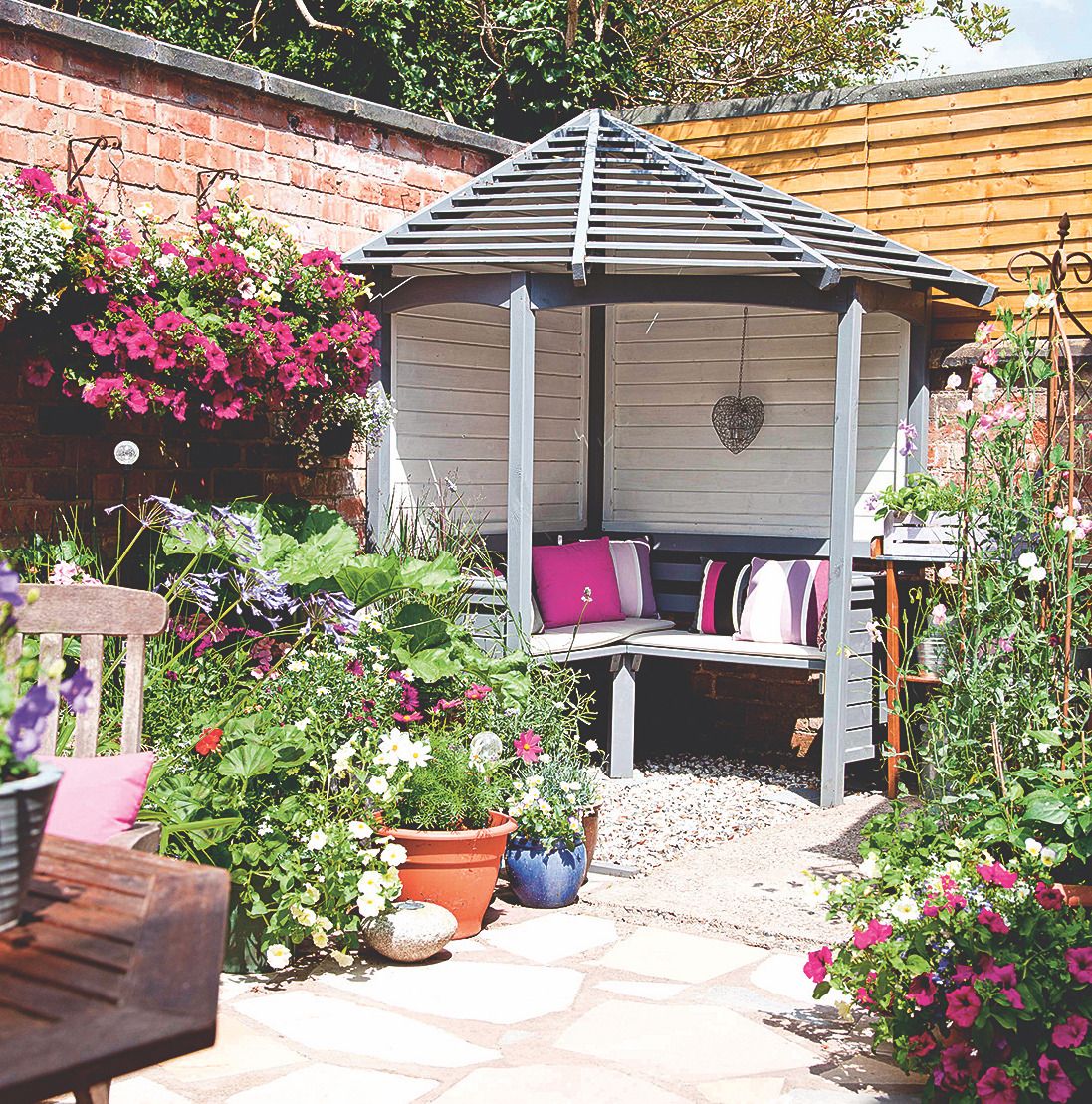
Enjoy your garden from a new angle with an arbour. These sheltered areas take up less space than a pergola would yet provide an extra shaded seating area.
Placing an arbour at the end of your garden in a sunny spot away from the dining area enables you to make the most of the space at different times of the day.
It could be a quiet retreat to enjoy a morning coffee before the day revs up, or somewhere to relax with a sun downer and take a breath after work.
15. Add interest with plenty of pots and planters
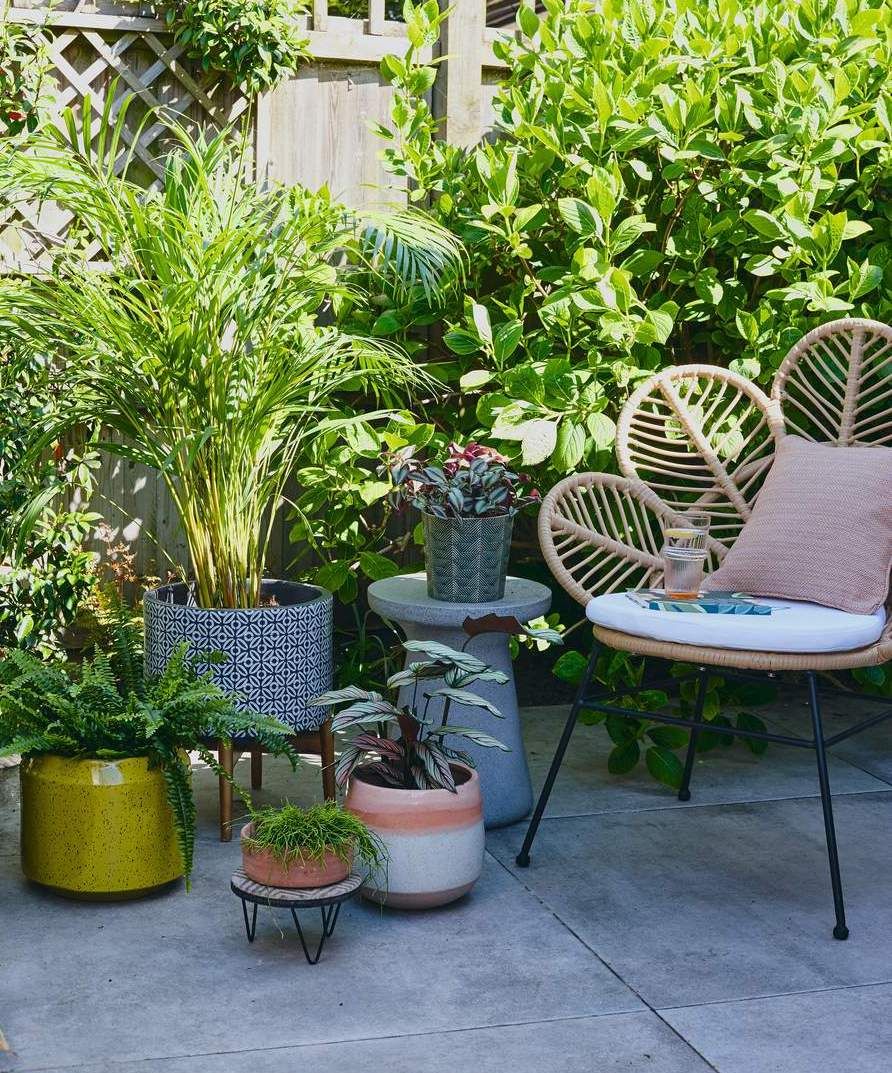
Having plants in pots and planters means you can move them around – and into a conservatory, greenhouse or indoors to protect them when a frost is due.
‘Interesting planters and pots of various heights mean they are not only a space saver but can be used to create a sense of enclosure when placed around a seating area, or as focal points around the garden,’ says garden designer, Alix Hollingsworth at Dig Club.
‘The style of planter is important too – ensure it’s in keeping with the overall style of the garden and even the interior of the house to create a sense of continuity. Don’t feel you have to stick to just one plant per pot.
‘For larger ones, consider a small tree like Olive or Bay, and underplant with trailing plants such as Vinca minor or Helianthemum ‘The Bride’ which tumble over the edges of pots and soften the edges.’
16. Use walls and fences for climbers
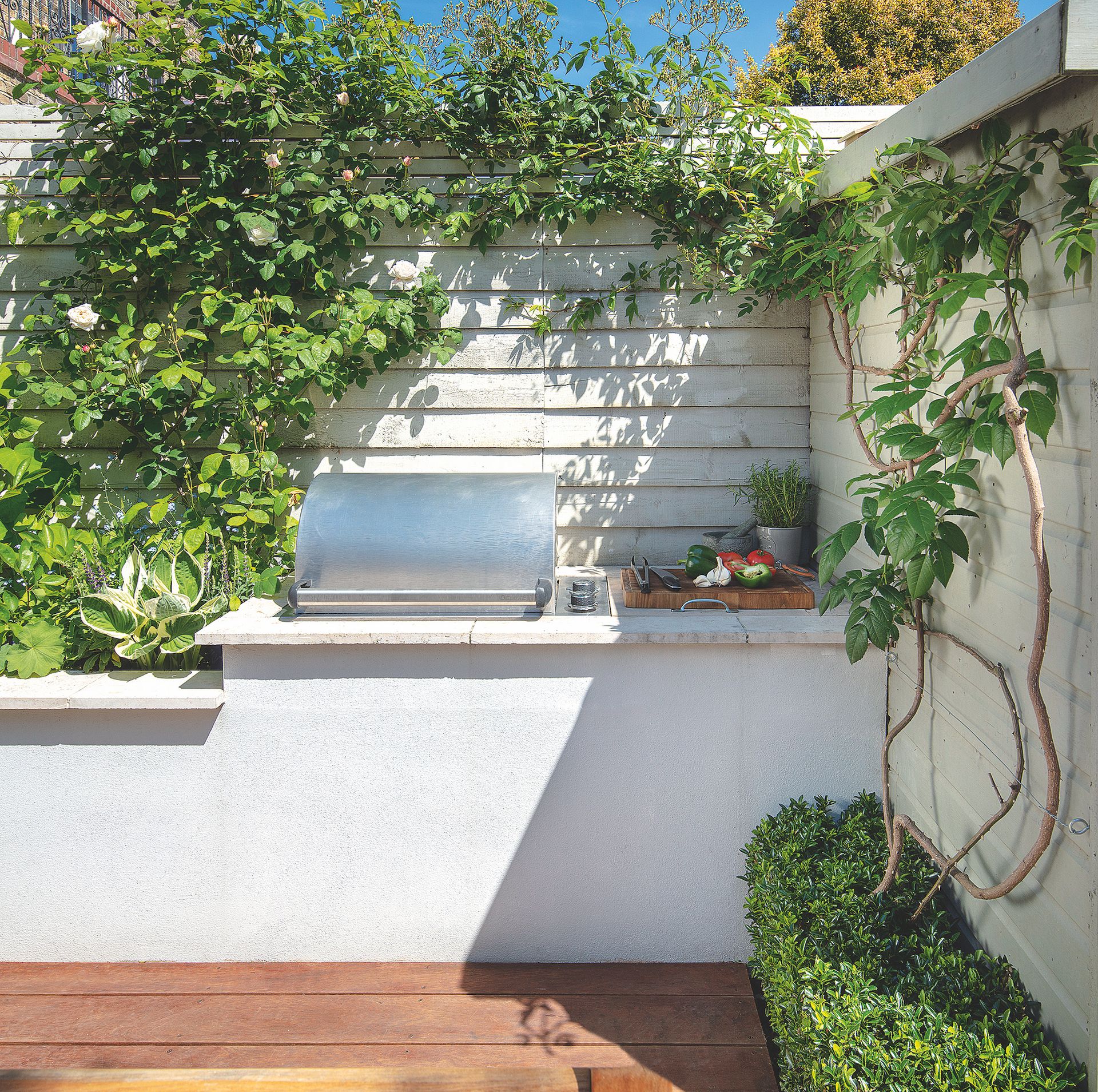
In a small space don’t forget to use walls and fences for greenery. Climbing plants provide shade and create a lovely sense of enclosure. They’re good at absorbing noise and pollution too.
‘Plant vertically in a small space,’ Alix Hollingsworth, Dig Club. ‘This could be with a living wall (although these can require a bit of maintenance), or with planters that are slightly oversized.
‘This also means you can play with the planting combinations within them and create interest and height with textures, colours and form. Using climbers such as the evergreen Star jasmine that can add interest and greenery, and don’t take up too much space.’
17. Take the indoors out
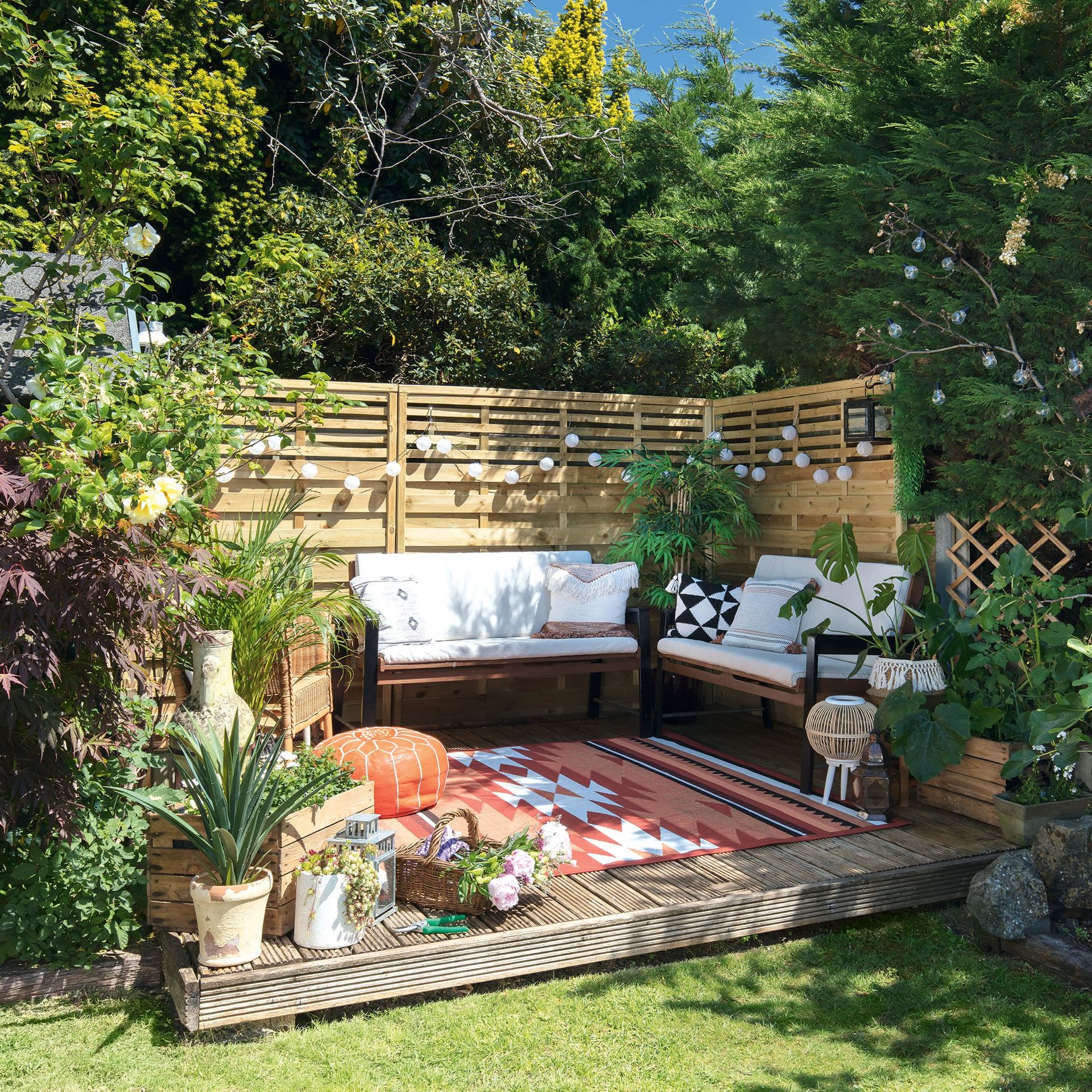
Make a small garden feel bigger by making it feel like a continuation of your indoor space with outdoor living room ideas. Making the most of the space makes it more valuable, no matter how small. Dress your small garden space with a furniture set and add decorative outdoor fairy light ideas to ensure it’s a space you want to spend more time.
‘Do not let attention to detail go amiss, the same principles apply externally as they do an interior project,’ says Emmie Brookman, Creative Director of Silver Mushroom(opens in new tab). ‘Your outdoor space should be an extension of your home, so make it comfortable and accessorise the same way you would indoors. Introduce cushions, throws, candles and bowls, after all you can always take them back inside if the weather turns.’
Similarly, a plethora of potted plants adds foliage, but as pots are moveable you get a sense of freedom to change things around from time to time.
18. Create a mini herb garden
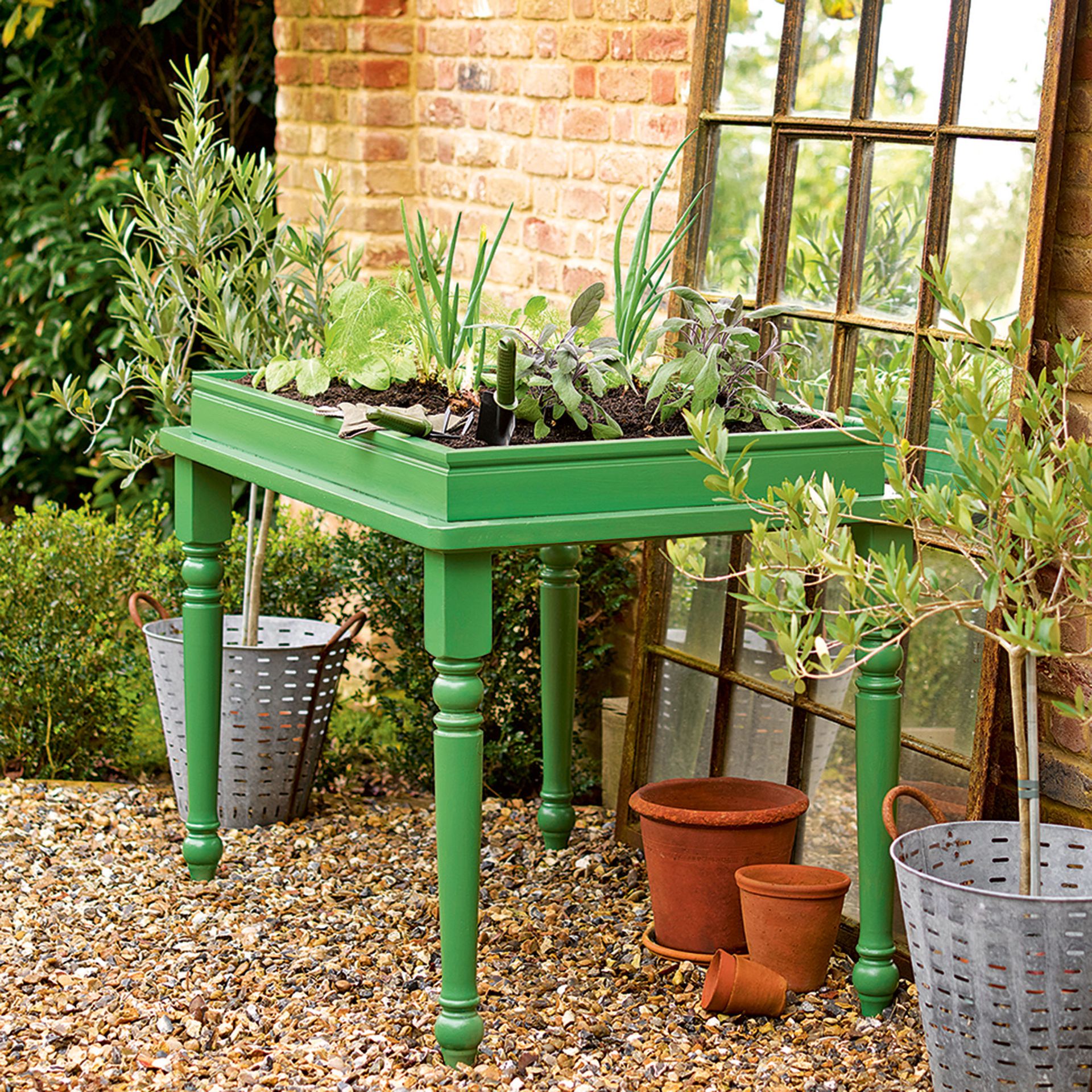
Herb gardens don’t have to only exist on your windowsills or in a large dedicated vegetable patch. Upcycle a side or coffee table to create a homemade and bijou planting area, perfect for herbs.
As well as saving you space beneath for extra planting or storage, by having the plants higher, you’ll save your back a lot of strain that you might get from bending over veg beds.
‘As well as herbs, salad leaves and lettuce are also incredibly easy vegetables to grow,’ says Cass Heaphy, gardening expert at Paving Direct. ‘Some plants come through within four weeks. Find seeds in your local shop and sow in regular intervals for a full salad bowl throughout summer.’
19. Grow your own veg in containers
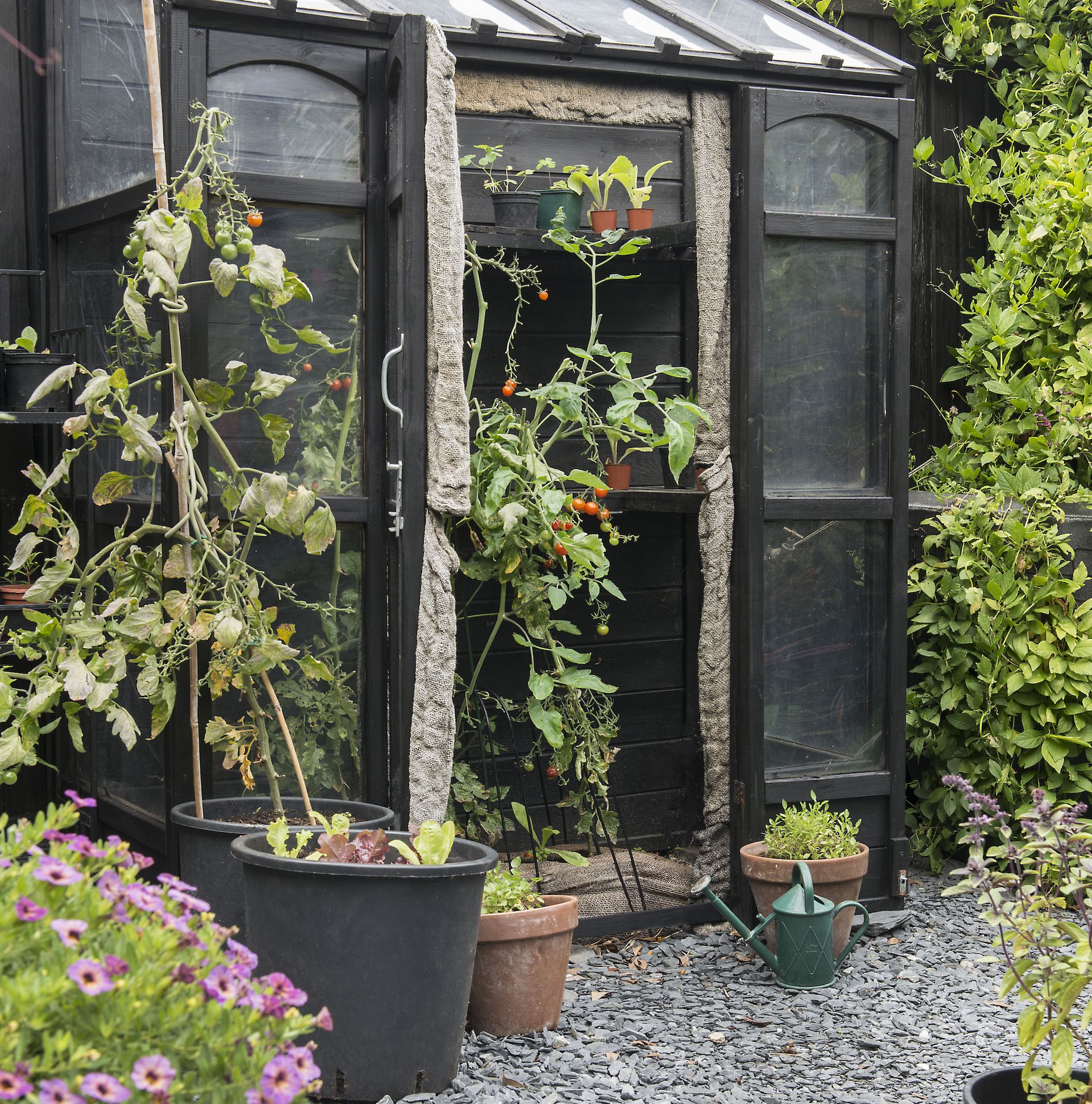
You may think this isn’t possible to grow your own veg in a small garden, particularly if you want to use it to socialise. But not all crops require a large dedicated patch.
‘Tomatoes are some of the easiest vegetables to grow in containers,’ says Cass Heaphy at Paving Direct. ‘As long as you have a location that receives at least five to six hours of sunlight per day, you can grow tomatoes in a small corner or even a balcony container garden with ease. There’s a large variety of tomato species out there but if you are limited for space choose smaller types such as Cherry tomatoes.’
‘Runner beans, sugar snap peas, broad beans, French beans can also be grown in a small spot, as long as they’re basking in the sun all day. All you need is a pot that is at least one foot deep, and if you have a climbing variety, a trellis-like structure for the vines to grow on. Make sure to sow seeds regularly so you get a succession of crops over the summer.’
20. Choose slimline options
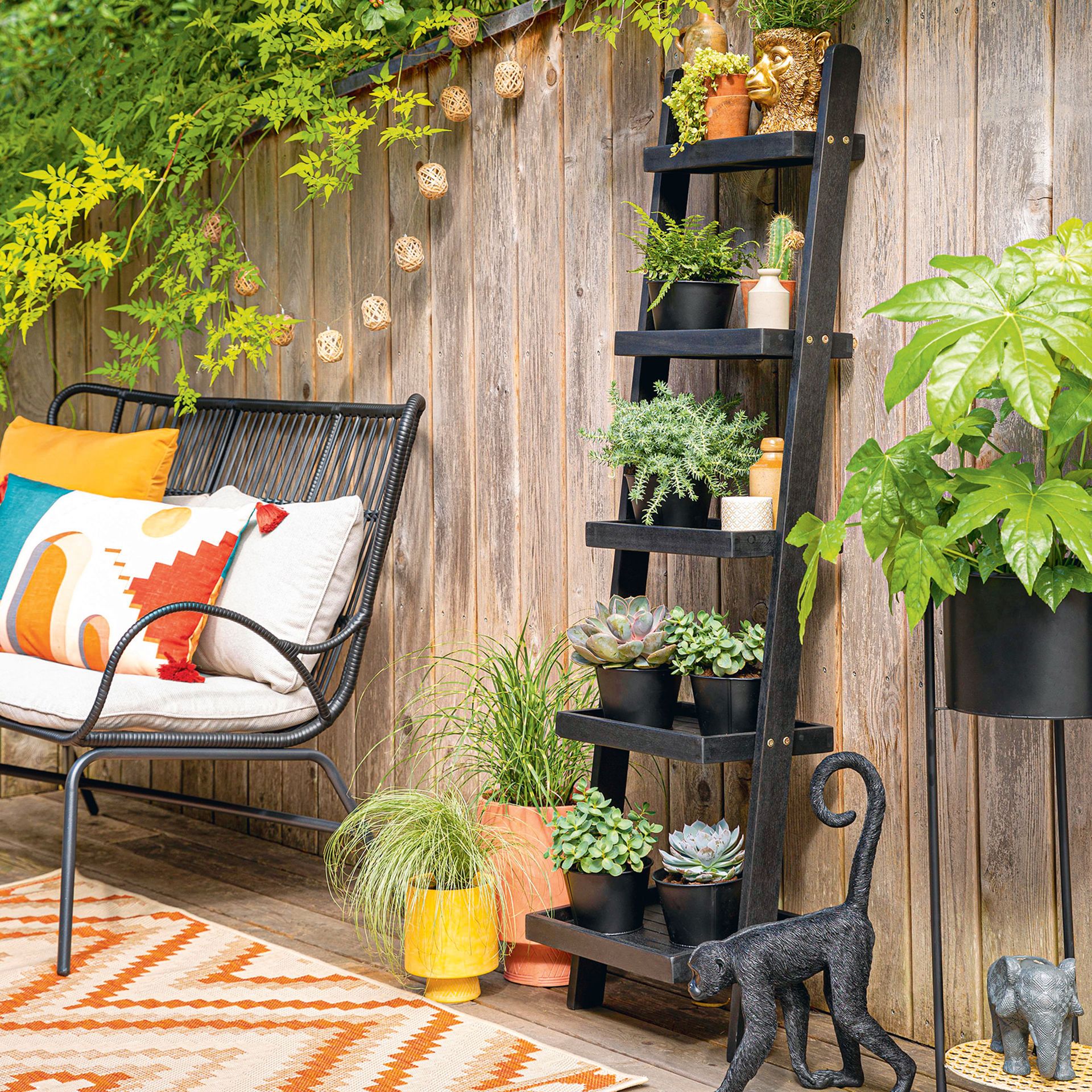
Slot in a slimline plant stand in smaller outdoor spaces. Cover bare areas of fence or brickwork with plants and trailing greenery and then look vertically for extra planting. Add a ladder stand to add height to displays – it’s one of the easiest budget garden ideas and easy to move if you fancy a change.
21. Add a gallery wall
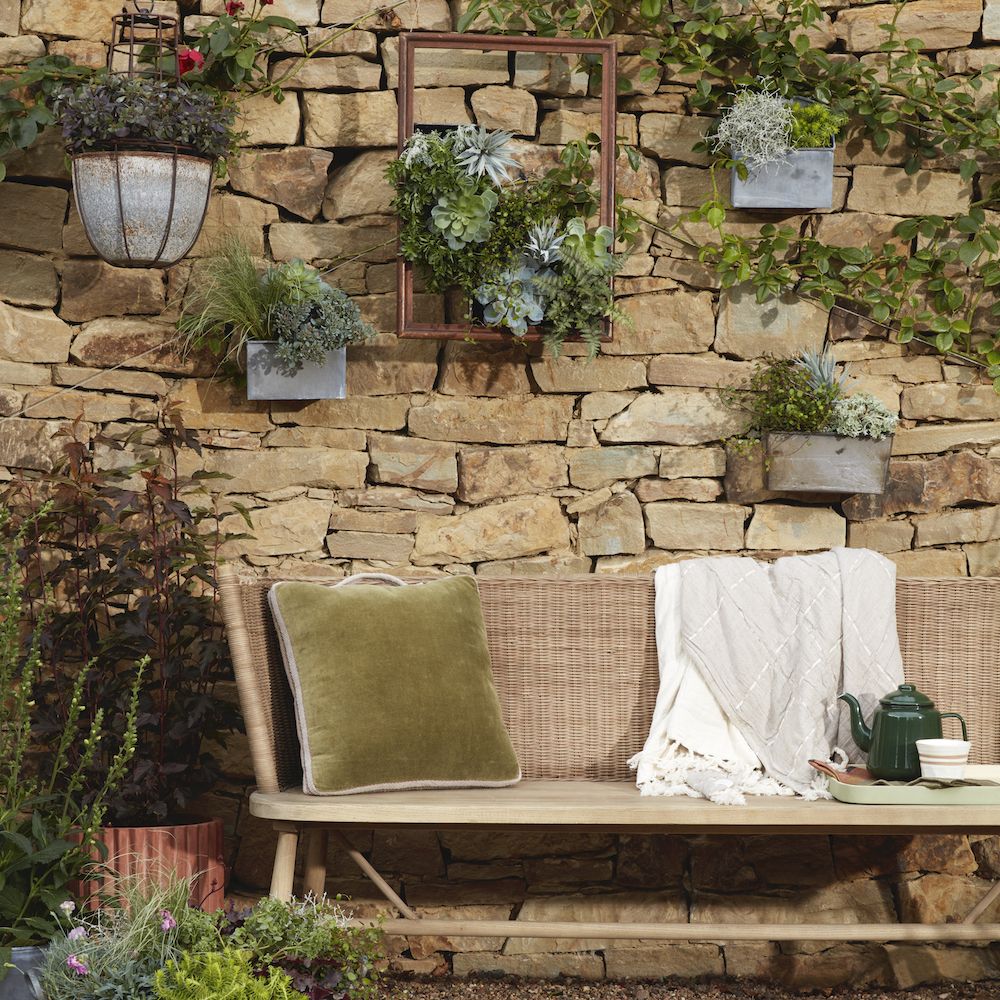
In the same way you would hang pictures indoors, create a display of frames and wall hung planters on an outside wall, fence or shed. Utilise junk shop finds by hanging old wooden frames and up-cycle old loaf tins as planters. Just drill holes in the base for drainage and in the side for hooking onto the wall.
Hang above a pretty garden bench, as you would a sofa indoors and finish off with some cushions and a throw.
22. Create a mini outdoor kitchen
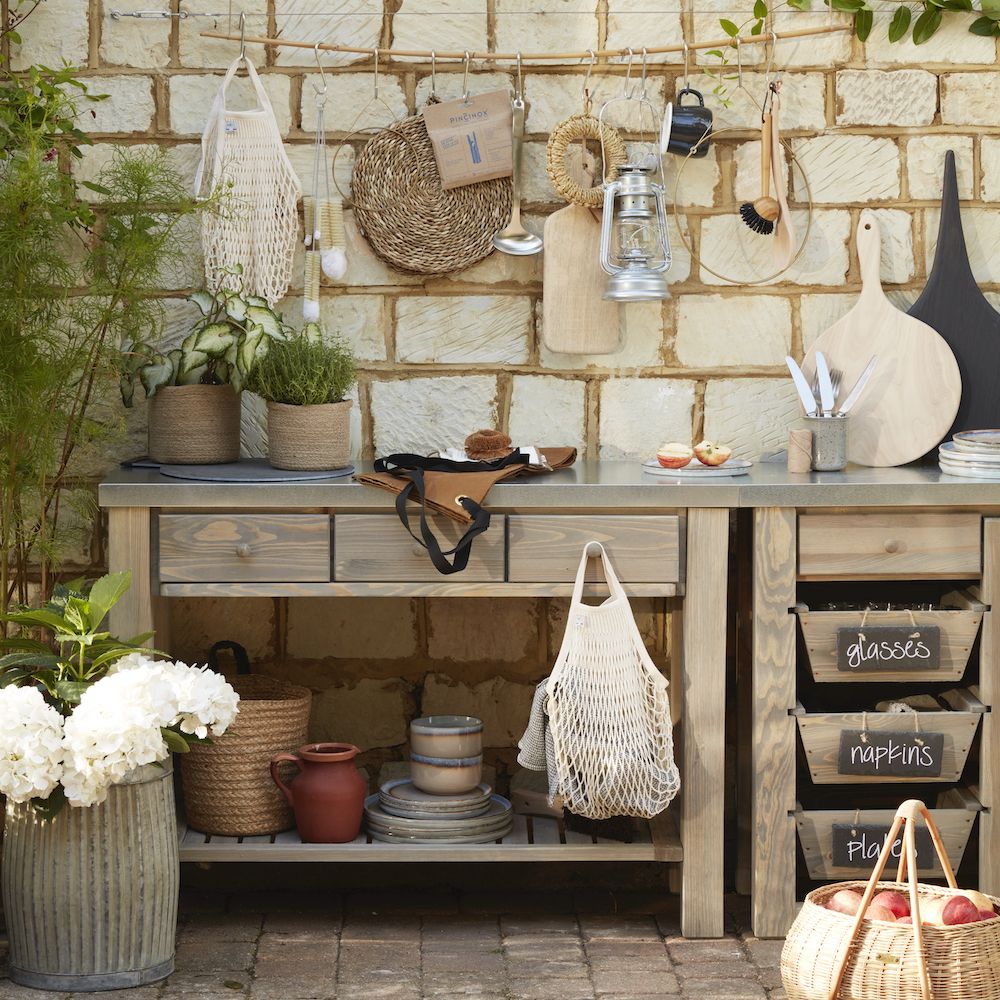
Extend your kitchen capacity into the garden. Potting tables can provide a slim, compact surface along one side of a patio for outside food prep, choosing units with galvanised or zinc topped surfaces will make wipe-down easier and protects wooden surfaces from weather damage, too.
Hang a bamboo pole above your units from cup hooks screwed into the wall or fence and use S-hooks to hang kitchen utensils along its length.
23. Double your space
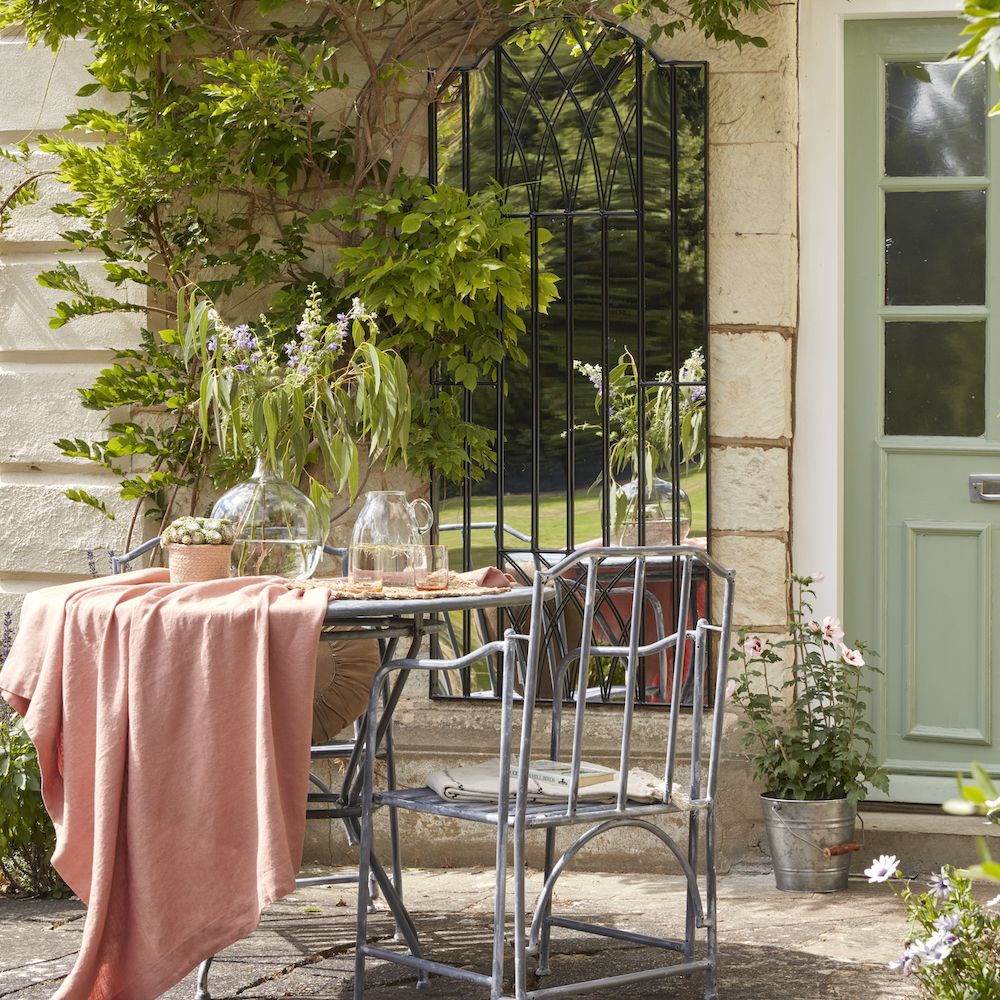
When working out how to make a small garden look bigger, one foolproof idea is to use garden mirrors. Create your own using an old gate or some painted trellis mounted onto a piece of mirrored board.
This is not only an inexpensive alternative to an outdoor mirror it also prevents any danger through mirror breakage. Set a table close by so that you can enjoy a view of the garden wherever you are seated.
Top tip: using a grid style mirror means that birds are less likely to fly into it.
24. Create a kids corner
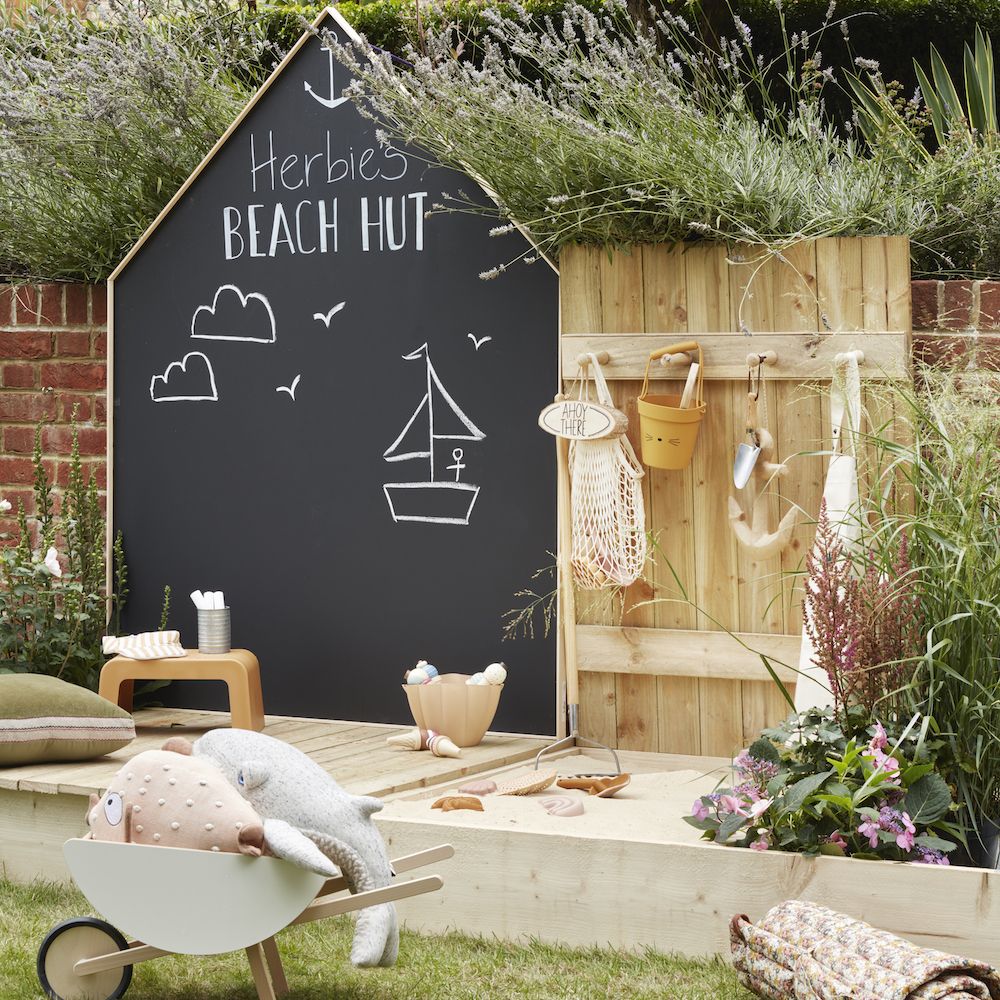
Sacrifice a raised bed to create a section of deck with a giant blackboard and covered sandpit for some sunny-day play. Try using old railway sleepers to create a barrier for sand and soil.
Finish by fixing a peg rail to the underside of the sandpit lid for hanging toys and tools.
25. Set up a private bar
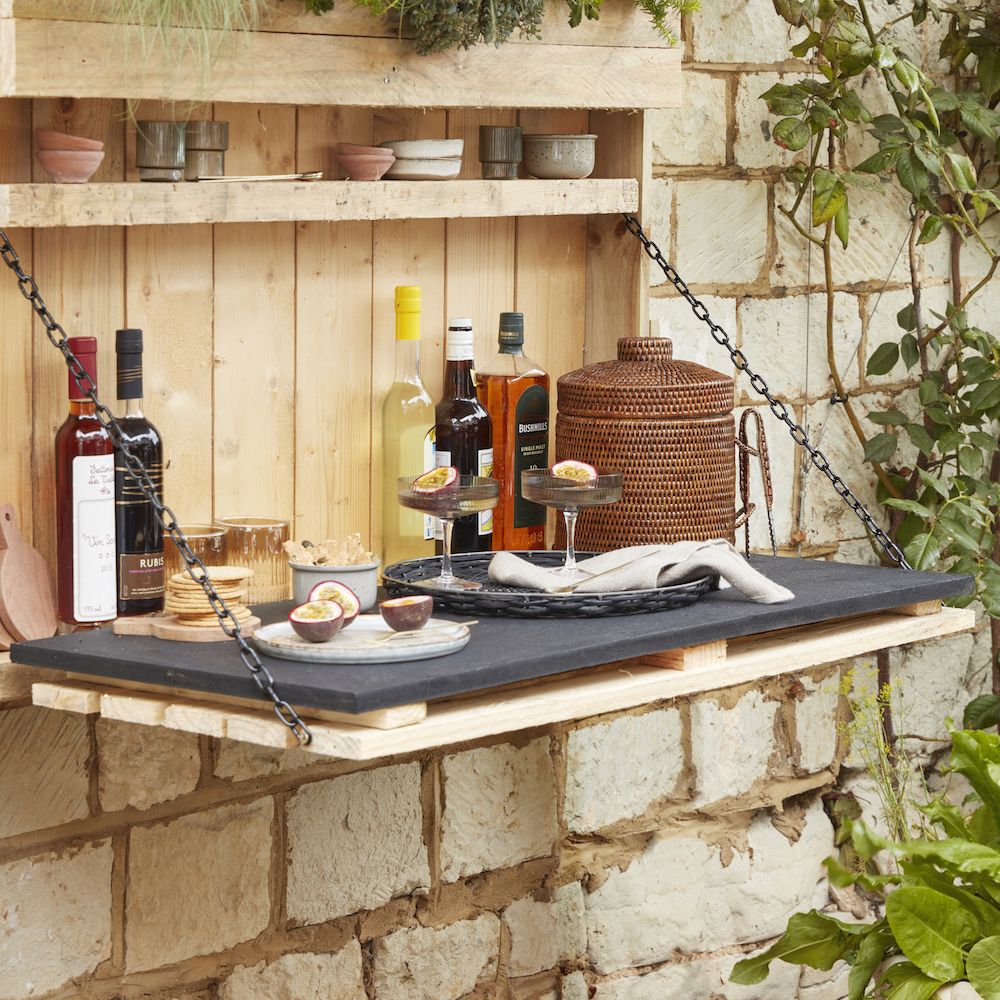
Look to outdoor bar ideas to create your own little entertaining zone with a clever pull-down bar made from a couple of pallets and a length of chain. Cut the top section from the pallet to use as the flip down section and attach using two strong hinges and lengths of chain.
Adding an outdoor herb planter to the top section will keep them within easy reach for drinks and barbecues.
26. Hang furniture to free up floorspace
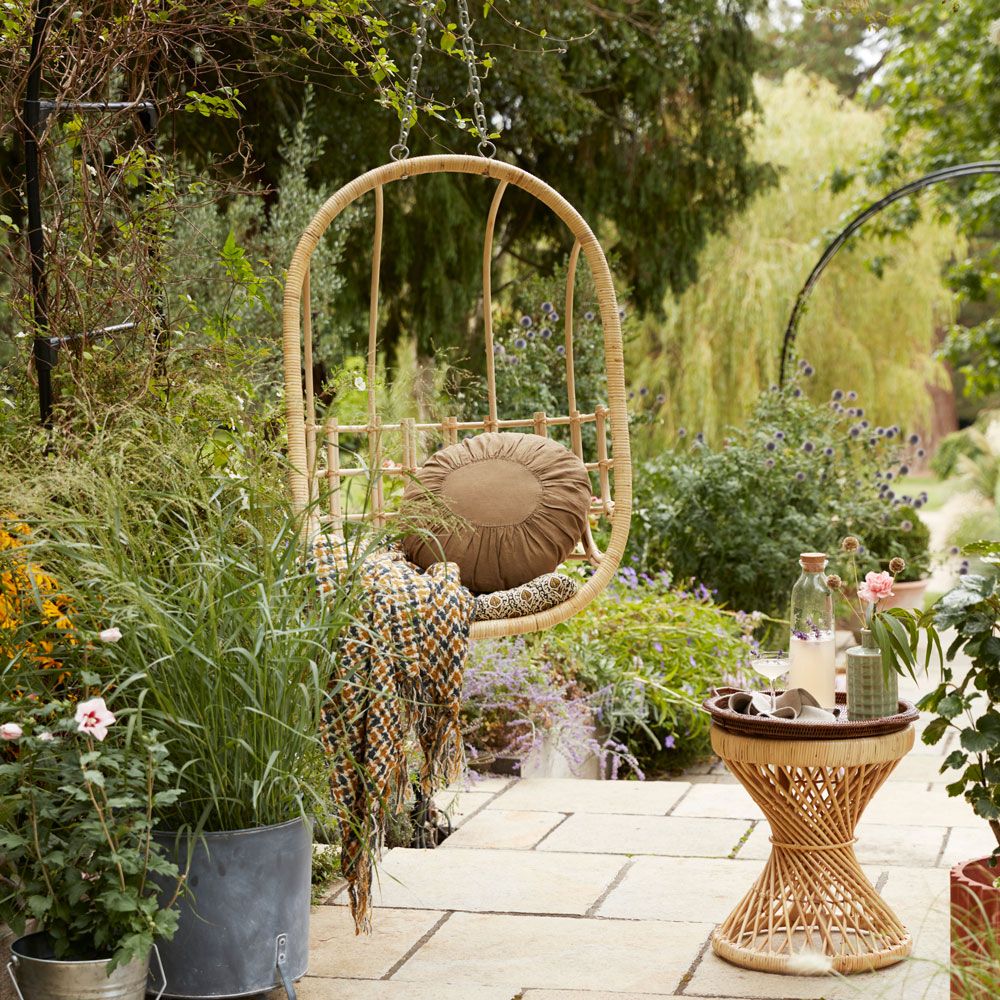
When working with small indoor spaces, designers will explain the importance of elevating furniture off the floor to create the illusion of more floor space. Wall-mounted bathroom units are a prime example of where this applies.
Use the same design idea in a small garden by choosing a hanging chair. A nook of a garden is all you need for a reading corner, the perfect place to get away from it all. This hanging bamboo chair keeps the floor and sightline clear giving a feeling of space in even the smallest of spaces.
Highlight the area with clusters of pots that contain foliage at varying heights and scales and mix up shop bought planters with vintage buckets or troughs. Mix materials like zinc, rattan and terracotta, to give your garden an effortless layered up look.
27. Make a small space work harder
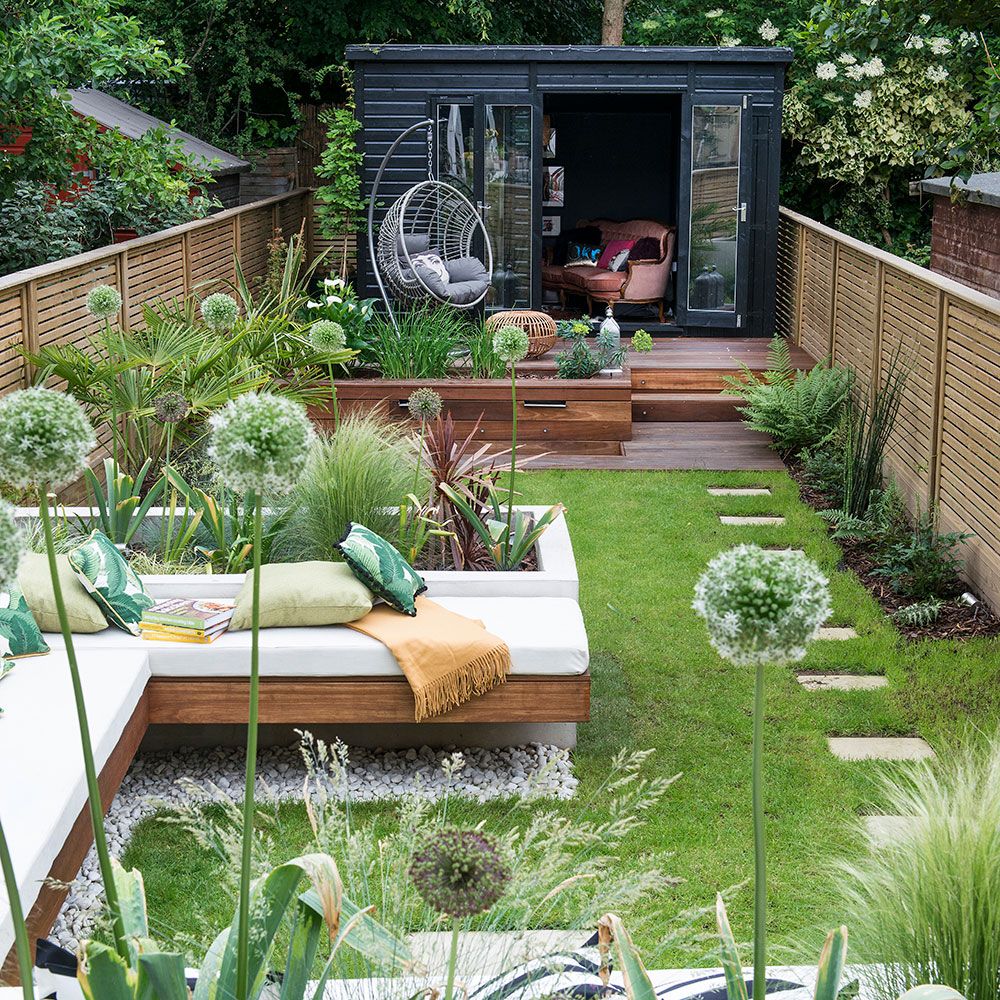
Divide your garden into zones to gain the illusion of extra space. With individual purposes, the space will feel larger because of the multifunctional uses and outdoor ‘rooms’.
Depending on available space, and what you like to do, there’s a multitude of zones you could create. Think an entertaining space, reading nook, outdoor kitchen ideas, play area, vegetable plot… the garden’s your oyster!
28. Add new levels
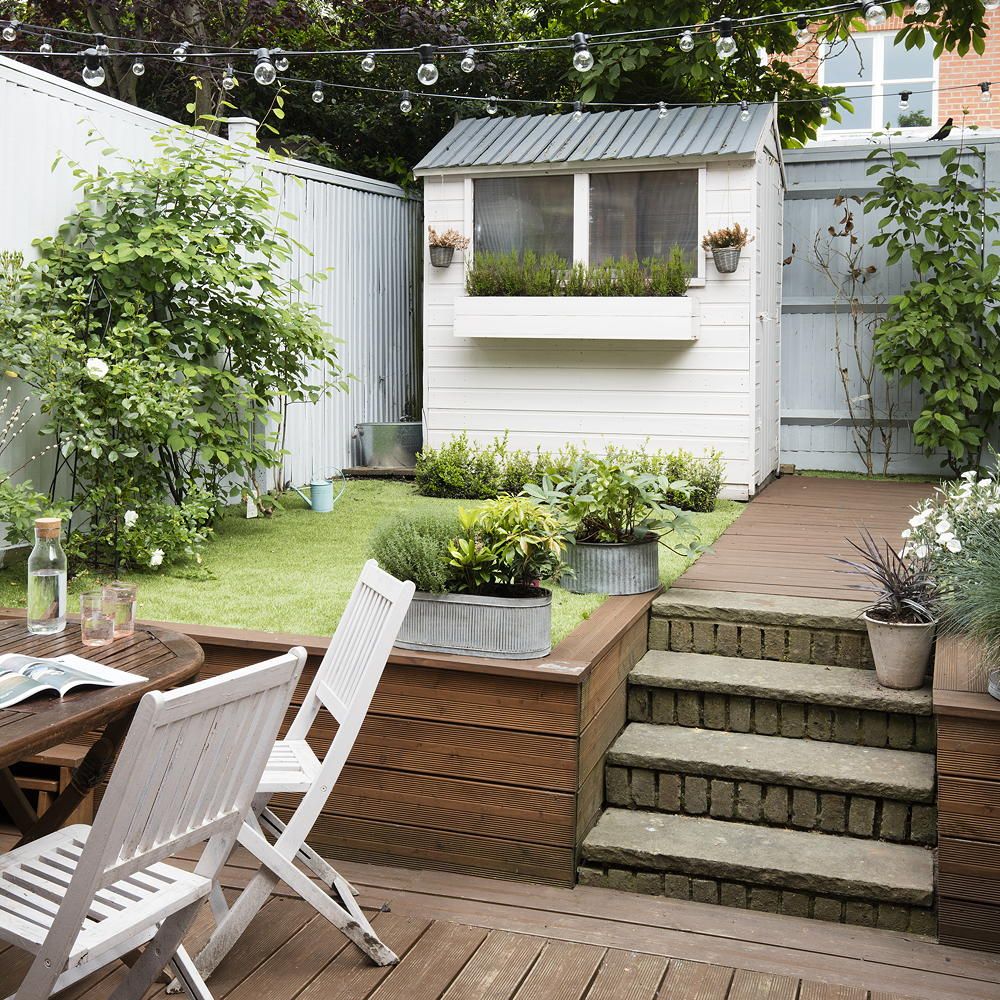
Add interest with small garden ideas by adding perspective with different levels. A classic way to do this is to have a raised or sunken terrace, and the lawn at another height.
The ledges and steps will help open up how you can use the space, adding in extra spots for plant pots to be arranged or areas to add furniture to accommodate guests.
You can also cheat this look with the clever use of raised beds.
29. Get creative with shelves and hooks
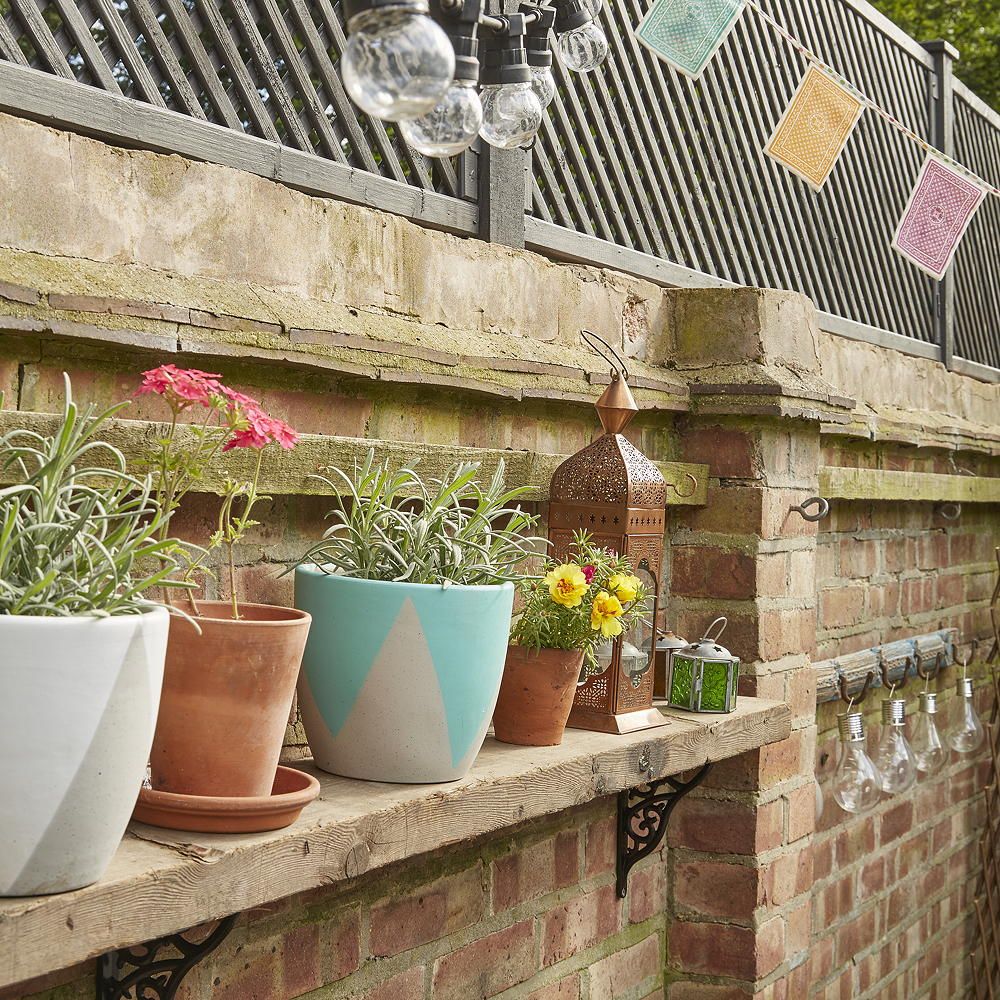
Shelves and hooks aren’t just for indoors. Create extra precious surface area for pots and pretty accessories by putting up some shelves. Ideally they should be mounted into brick, as your garden fence might not be able to take the weight.
Reclaimed scaffolding boards are an inexpensive solution, supported by wrought iron brackets that you can pick up for a few pounds from your nearest DIY store. The wall-mounted shelves will clear up your floor space from lanterns and plant pots. A recycled peg rail can also become the perfect place to hang outdoor lighting.
30. Use paint to trick the eye
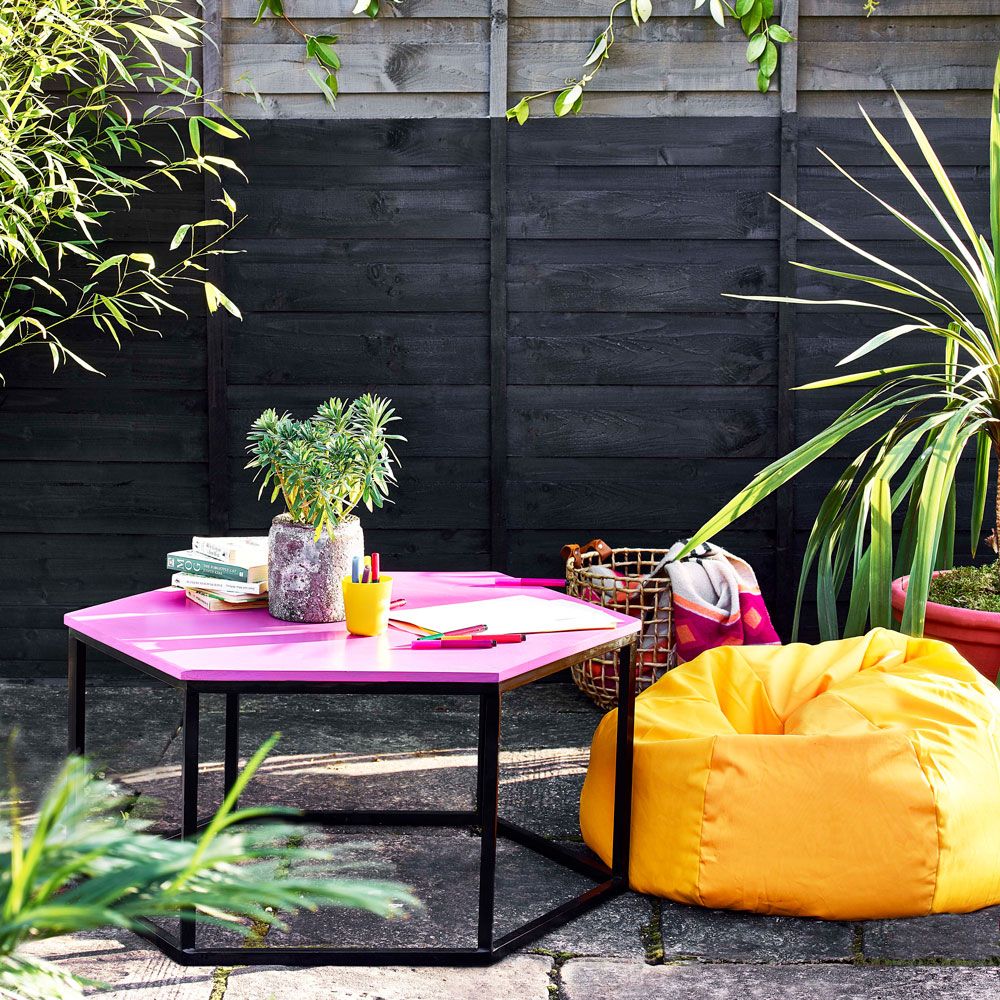
Draw the eye up with a cleverly painted backdrop, creating the illusion of extra height and space. A simple two-tone block colour treatment can jazz up any expanse of garden fencing.
Using a dark colour helps to make more of a statement with the effect, it also compliments green foliage beautifully.
31. Make the most of space with a multifunctional shed
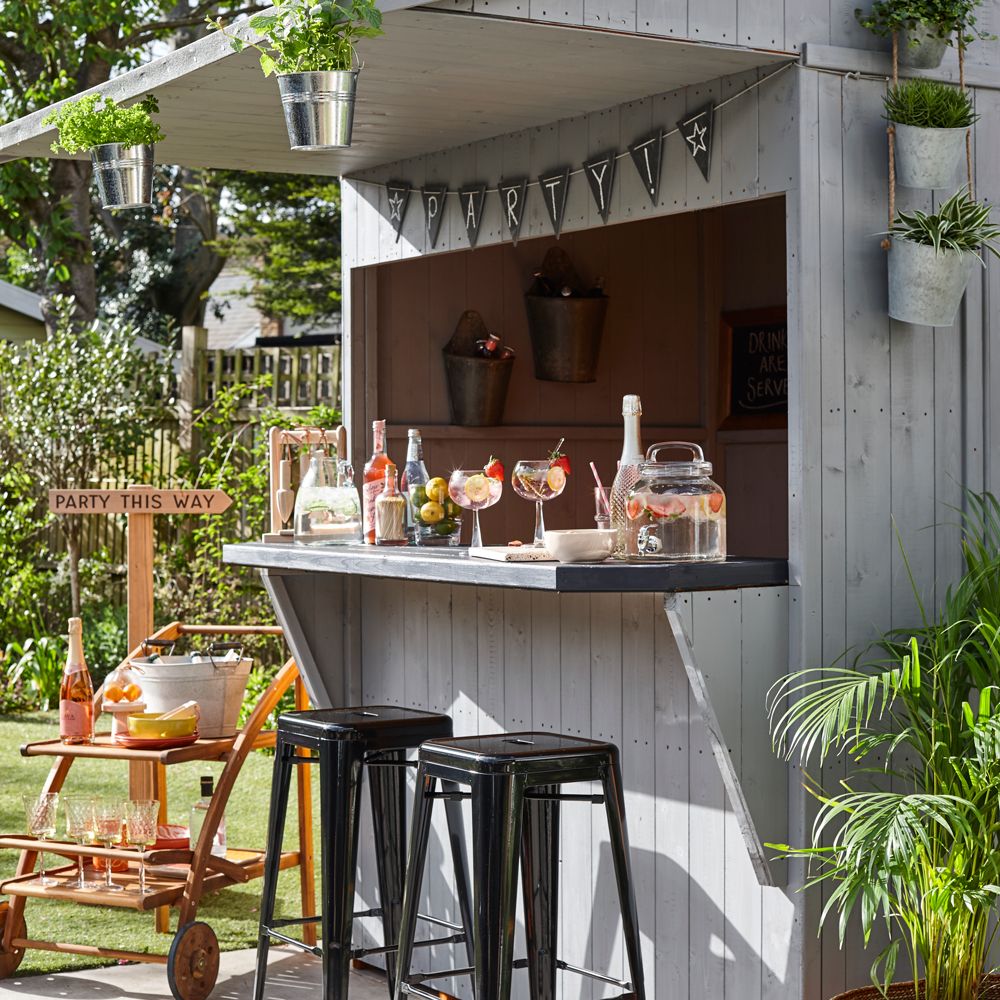
Make a shed work harder in your small space by making it multifunctional. Use the shed to house garden furniture in the winter, then open out into a bar for garden parties and alfresco sundowners in the summer months. Cheers to that idea!
32. Use every corner of a courtyard
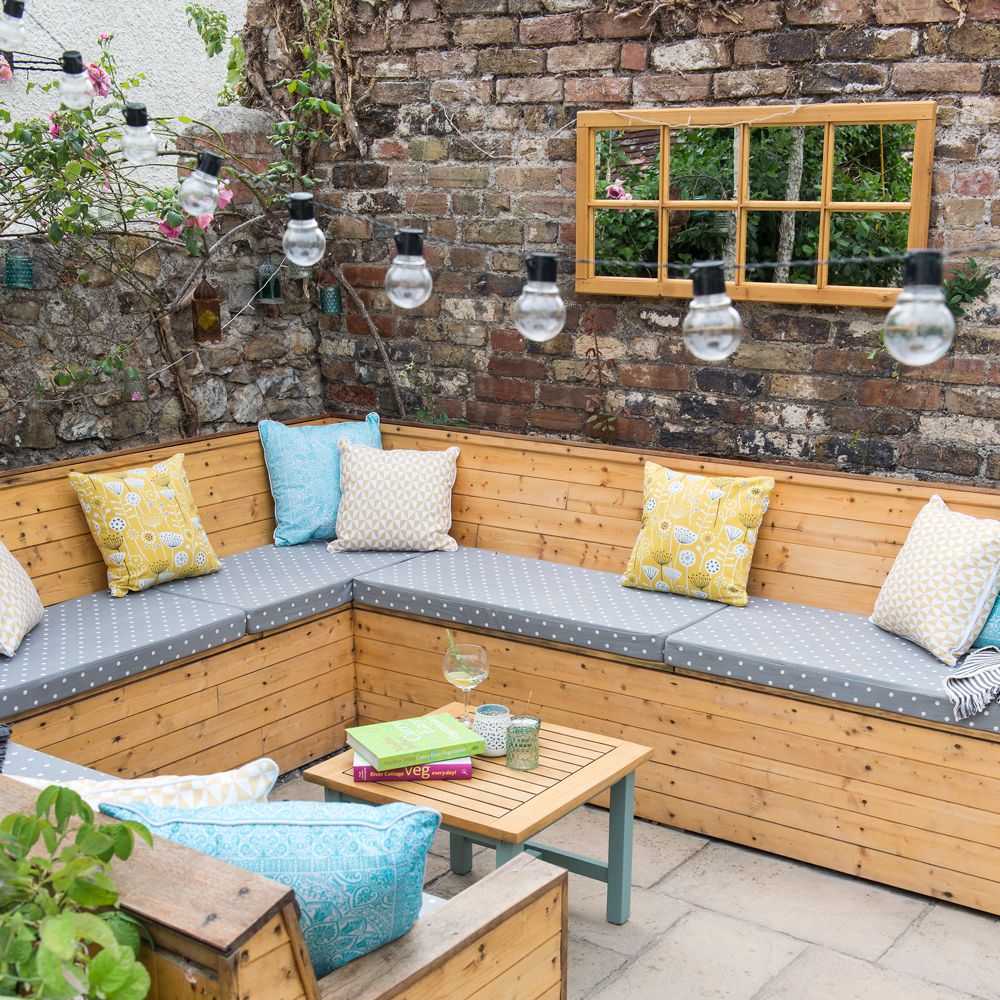
If your small garden space is a courtyard think about how you can use every inch of space to full potential. Often a courtyard area has the potential to feel very enclosed, simply by the nature of looming brick walls surrounding it.
Using clever corner seating will not only use the space most effectively, the high-back sofa design can help to hide a large portion of said imposing walls. This in turn will distract from the walls and create the illusion of space.
33. Fix planters under the kitchen window
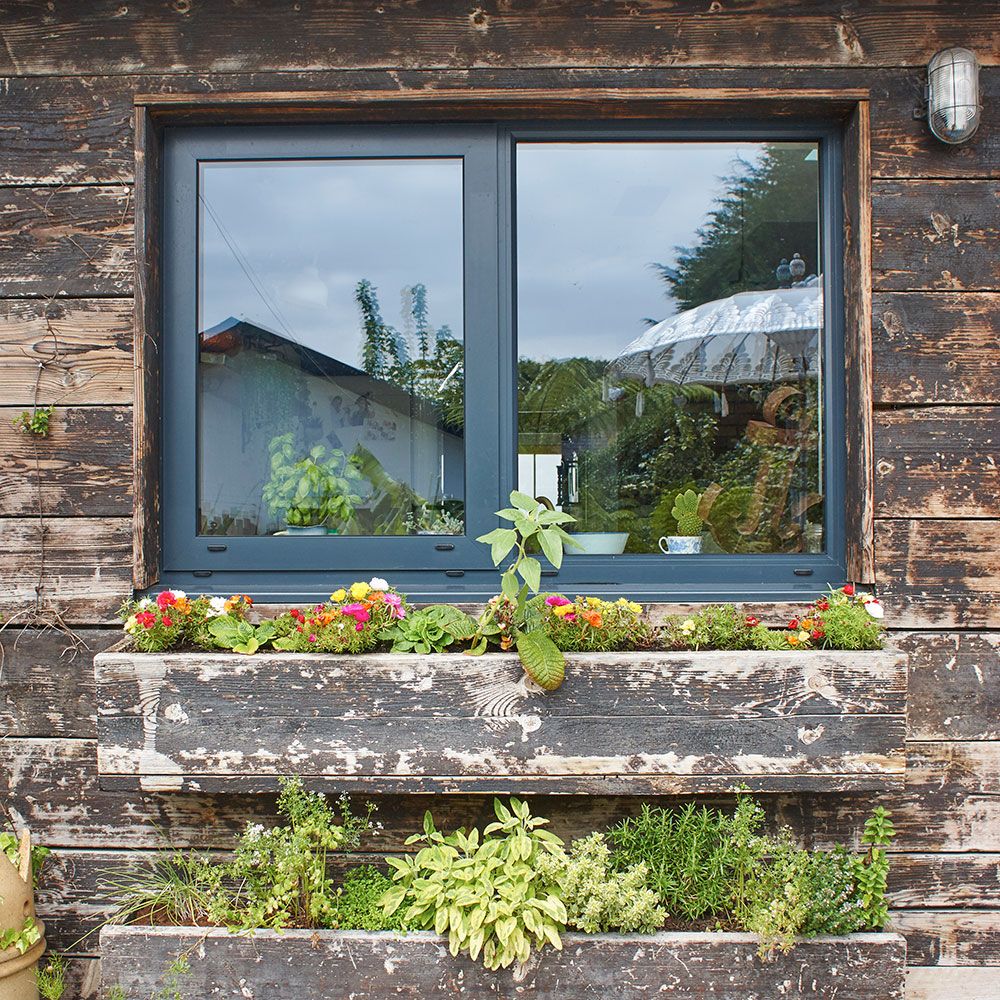
Window boxes are a classic way to add planting to small spaces, but go one stage further by doubling up. Simply buy or build two simple troughs on top of one another.
It’s a great place to grow herbs, especially if placed underneath a kitchen window. Just open the glass and reach out to grab what you need.
34. Plant a garden in pots to surround the seating
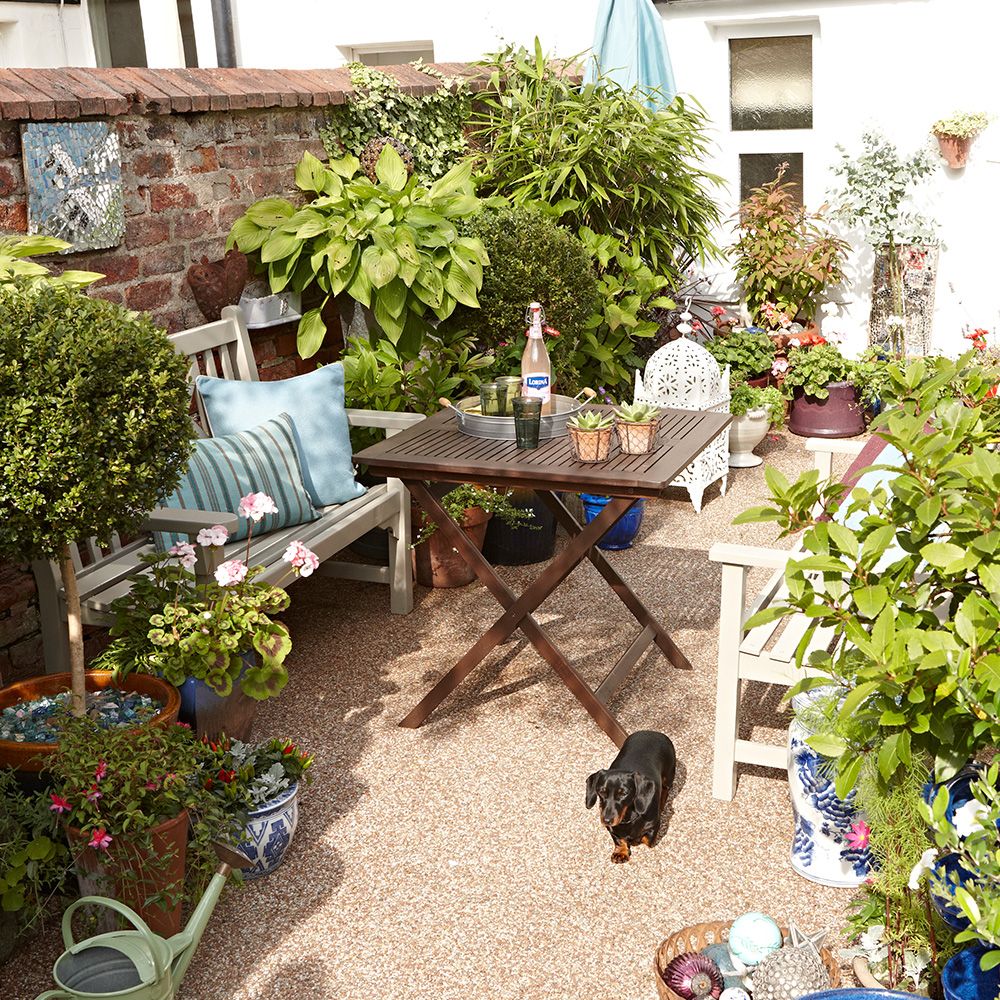
You don’t need a lawn to create a lush garden – and flower beds aren’t necessary either. A low-maintenance ‘flooring’ option such as gravel is great for small gardens. Add lots of pots, filled with everything from the tiniest flowering plants to tall and bushy trees.
Finish off with some garden furniture and you’ll have the perfect spot to enjoy a summer’s day.
35. Brighten with colourful furniture
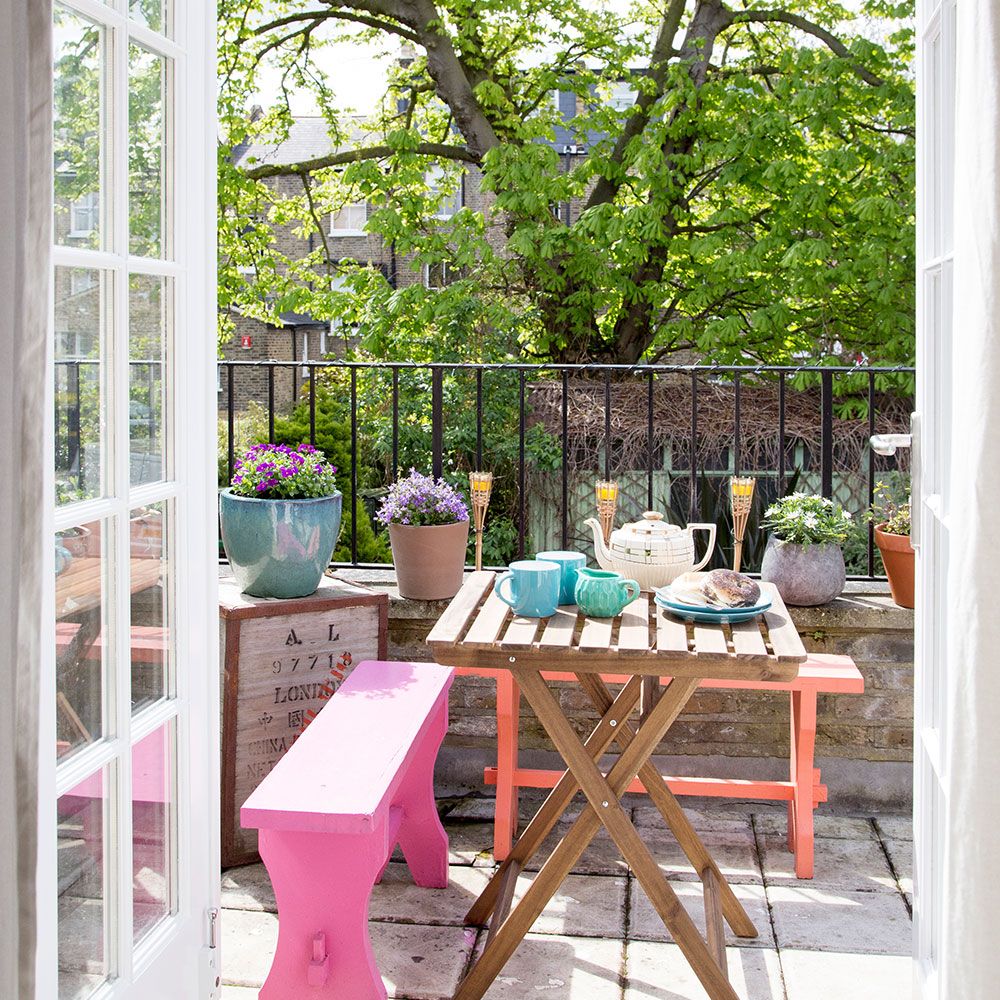
Even the tiniest terrace can be transformed into something exceptional. If your garden is short on square footage, a planted terrace can be a good solution, combining elegance with low maintenance. Simple paving such as travertine or traditional stone creates a sleek or rustic look, while clever planting will soften and provide privacy.
Just add comfortable seating to create an ideal outside room. Plus, if your WiFi should reaches to your terrace, you’ve got a ready made summer WFH spot.
36. Aim high
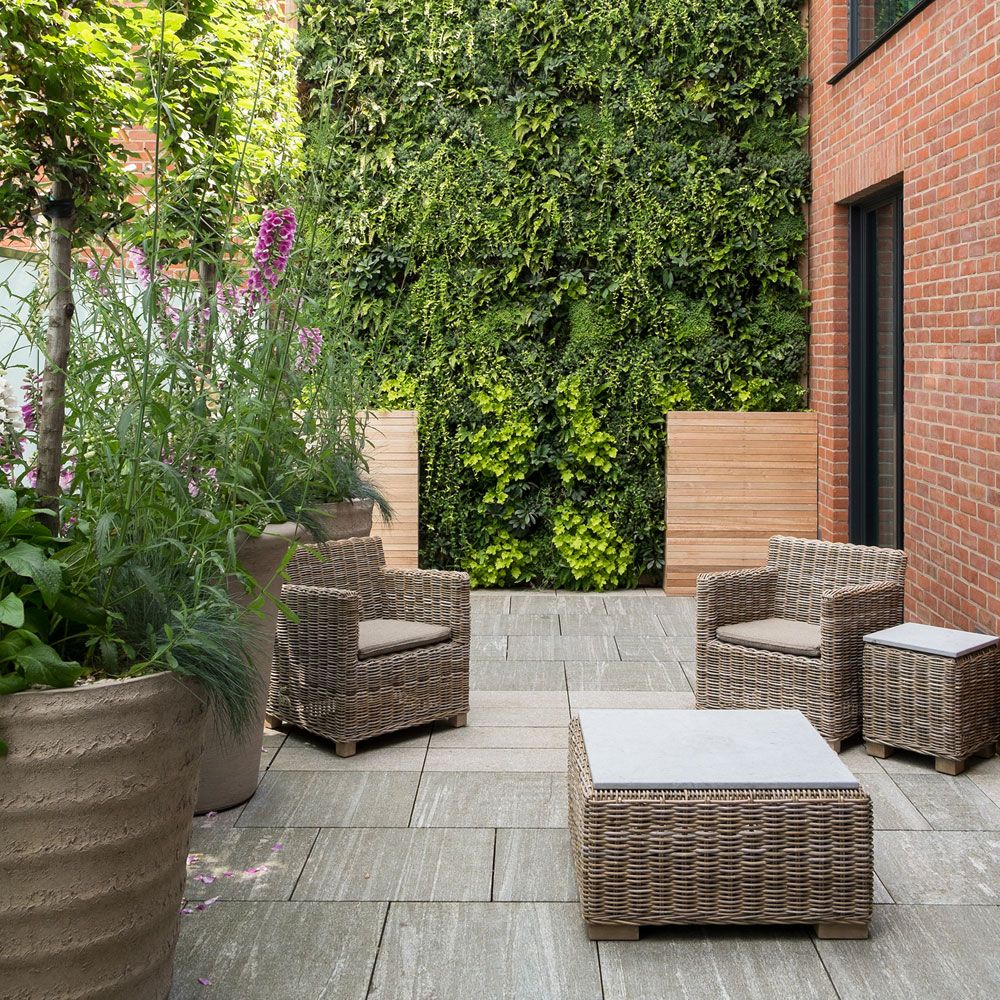
Turn a small courtyard into a lush habitat with a tactile and towering living wall. Plant up a natural focal point for a super contemporary way to add interest while keeping much-needed floor space clear for patio slabs and super-sociable seating. Balance the domineering wall with a trio of large pots with small fruit trees and bedding plants.
Living, or green, walls, once the domain of designer installations and pioneering commercial sites, are increasingly making their way into residential gardens. When it comes to how to make a living plant wall, foliage is rooted into a structure that is attached to a wall.
A range of herbaceous perennials, grasses, small shrubs, herbs and even fruit and vegetables can be used to create these vertical small garden ideas. Try including scented plants, seasonal flowers and bulbs, but talk to your local garden nursery about plants that will suit the aspect and microclimate of the wall on which they will be grown.
37. Build a cool cabana
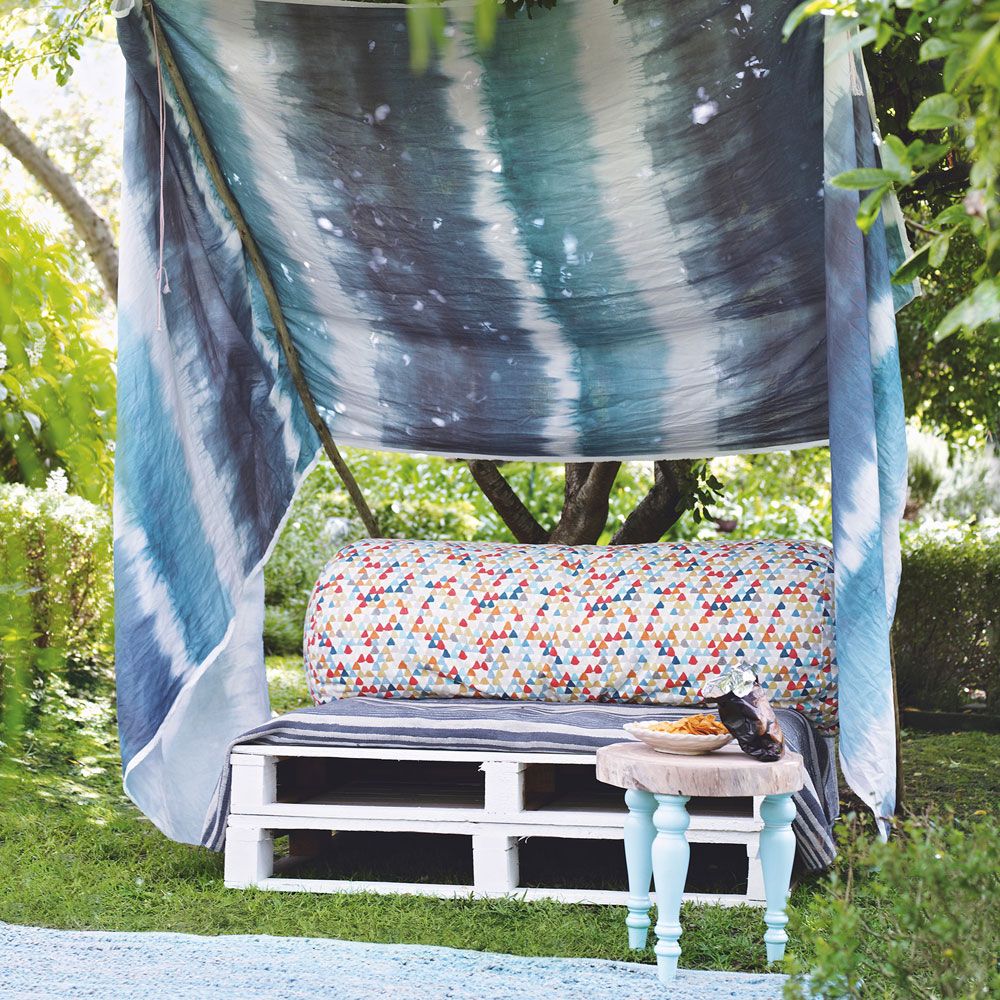
Include garden shade ideas in your small garden with a homemade sun lounger – a few square feet, budget materials and your imagination are all you need. It’s a fine summer garden idea you’ll thank us for when the heatwave finally hits.
Take two branches, two pallets, and a fabric offcut and assemble them to create a bohemian lounger for two. Make it comfortable and inviting with a bolster in funky geometric fabric. If your garden is dominated by the overhang of a tree, angle the fabric so that it can also act as a canopy, protecting the area below.
38. Pretty up with soft furnishings
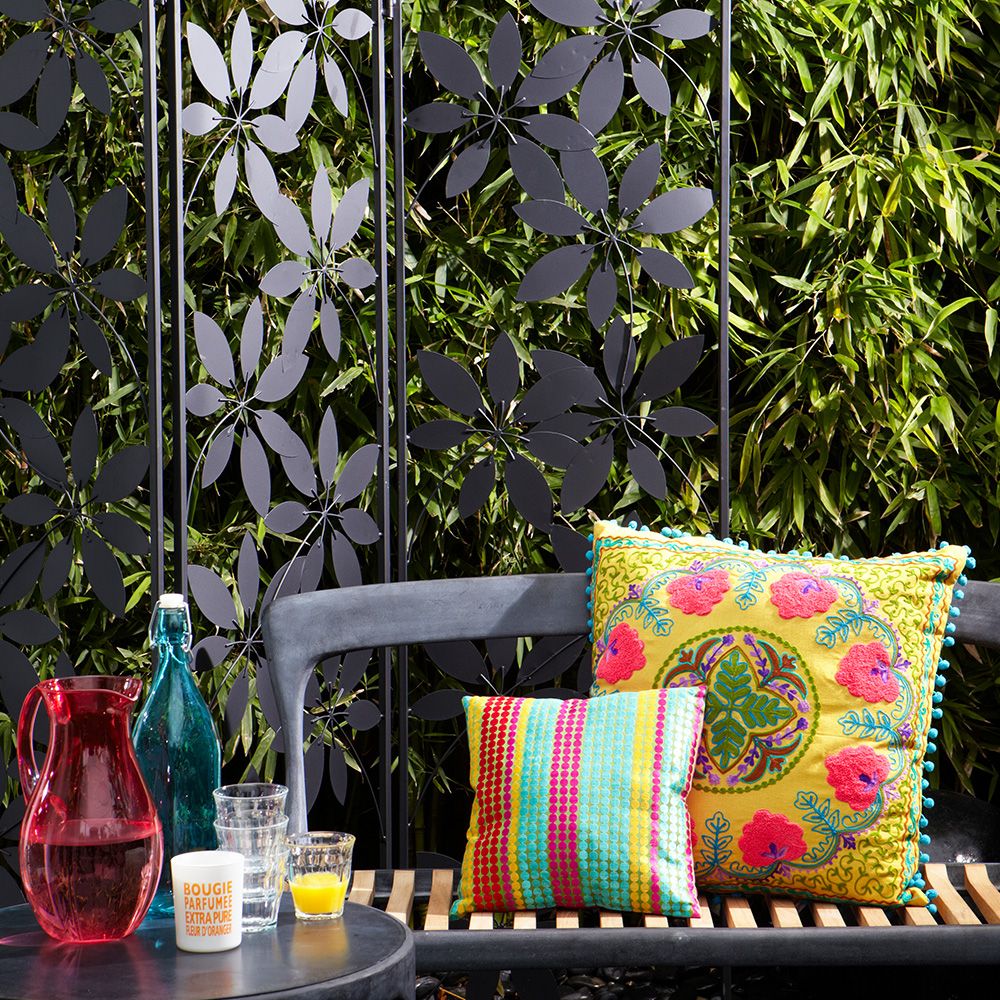
Small garden ideas require careful planning if you’re going to make to most of a cosy corner. A garden bench is a practical and stylish way to make an impact – if you don’t mind relinquishing some precious floor space – and will be perfect for lounging should the sun make an appearance this summer!


